#based on... it being named after the book it is adapted from?
Explore tagged Tumblr posts
Text
Lol bryony is really simultaneously complaining that marketing isn't promoting a star trek actor's role in a show (whose face is all over tumblr) and complaining that it retains the name of the famous book it's adapted from? Tbh i am glad to know there's an adaptation of Three Body Problem but i cannot say I'm a fan of changing the title in adaptations so you can't even tell it's based on that thing you read
#also kinda wild for her to assert that it won't get renewed#based on... it being named after the book it is adapted from?#and not enough emphasis on an actor who seems to be doing interviews about it?#why do i still follow bryony#obviously she watched it apparently without any attachment to the book#it's the first thing you see on netflux#I feel like advertising about aliens would be a potential spoiler?
2 notes
·
View notes
Text
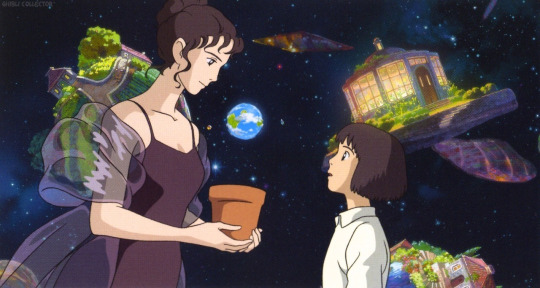

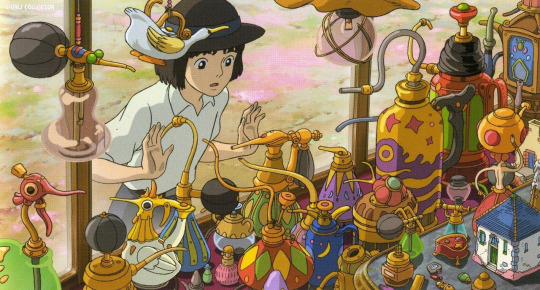

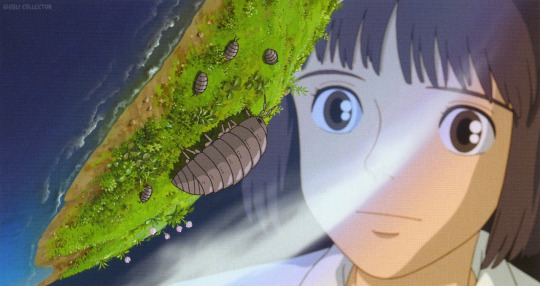

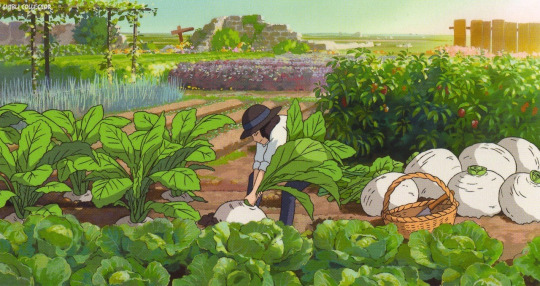


Did you know Studio Ghibli made a film in 2006 based on the young Howl? Many Japanese people believe this character is based on Howl as a youth as seen when Sophie travels through time. The film is called “the Day i bought a star” (Hoshi O Katta Hi) and as we know Howl has had childhood experiences with stars, also being known as ‘the boy who swallowed a star’.
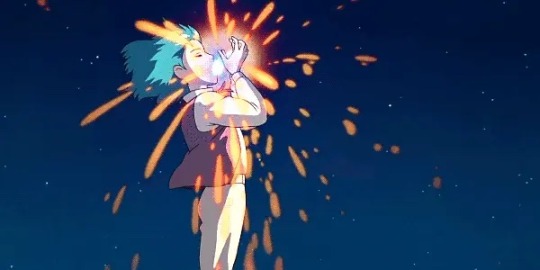
The short film 16 minutes in length was written and directed by Miyazaki and is shown exclusively in Tokyo’s Ghibli Museum and the new Ghibli Park in Aichi prefecture but the story is a partial adaption of book by the same name by Naohisa Inoue (you might recognise art style visuals from the fantasy sequences of Whisper of the Heart also drawn by Inoue).
As you can see from the images above the film also features a magical woman older than Howl (could that be a certain mentor witch? 🤣) and a boy who looks very like Howl who lives on his own in the country side. The film was also Miyazaki’s first project directly after the release of Howl’s Moving Castle in 2004.
I’ll not go into the story except to say it’s a beautiful and mystical ethereal tale that leaves you with a lot of unanswered questions and i hope you all get to see it in the Museum or Park some day! But for any of you reading who are lucky enough to have seen it please comment your thoughts 🥳
3K notes
·
View notes
Note
hey!! i am genuinely curious about how the catholic church helped implement the hays code, would you be able to tell me more/do you have any good reading material about it? thanks so much!!
This has been sitting in my inbox for aaaaaages, because I want to do it justice! It's actually a big facet of my research project that I'm going to go into much, much, much more depth on, but here's the short(er) summary:
The foundational text of the Hays Code was written by two Catholics: a Jesuit priest named Father Daniel Lord, and a man named Martin Quigley, who was the editor of the Motion Picture Herald. They grounded their guidelines in Catholic morality and values, based on the idea that art could be a vehicle for evil by negatively influencing the actions of those who view it.
The original list of guidelines written by Lord and Quigley was adapted into the Production Code, popularly known as the "Hays Code" after William Hays, the president of the Production Code Administration that enforced it. As president of the PCA, William Hays appointed a staunch Catholic man called Joseph Breen to enforce the code. Breen enforced it aggressively, confiscating the original reels of films he deemed inappropriate and against the Code. Many lost films from this era are only "lost" because Joseph Breen personally had them destroyed. Some were rediscovered later, but many were completely purged from existence.
When Breen died in 1965, Variety magazine wrote, "More than any single individual, he shaped the moral stature of the American moral picture." He was a very, very big deal, and was directly responsible for censoring more films than I could even begin to list here.
In 1937, Olga J. Martin, Joseph Breen’s secretary, said, “To an impoverished country which had become religious and serious-minded, the sex attitudes of the post-war period became grotesquely unreal and antedated. The public at large wanted to forget its own derelictions of the ‘gay twenties.' The stage was set for the moral crusade.”
In 1936, once the Code was being fully enforced on filmmakers by Joseph Breen, a letter was issued by the office of Pope Pius XI that praised Breen's work, and encouraged all good Catholics to support film censorship.
The letter read in part, "From time to time, the Bishops will do well to recall to the motion picture industry that, amid the cares of their pastoral ministry, they are under obligation to interest themselves in every form of decent and healthy recreation because they are responsible before God for the moral welfare of their people even during their time of leisure. Their sacred calling constrains them to proclaim clearly and openly that unhealthy and impure entertainment destroys the moral fibre of a nation. They will likewise remind the motion picture industry that the demands which they make regard not only the Catholics but all who patronize the cinema."
Basically, this letter was a reminder from the Papal authority that bishops and priests are supposed to stop people from engaging with "lewd" or "obscene" art. That meant supporting things like the Hays Code.
So, to summarize: the original text of the Hays Code was written by two Catholics, including a priest. The biggest and most aggressive censor under the Code was a Catholic man, who had the full support and approval of the Pope at the time. Good Catholics were called en-masse to support the Hays Code, because it was intentionally written to line up with Catholic teachings.
There's a lot more to say on the subject, and if you're interested in reading more on your own, I recommend the book "Pre-Code Hollywood: Sex, Immorality, and Insurrection in American Cinema, 1930-1934," by Thomas Doherty. There are plenty other sources I can recommend on request, but that's a solid place to start.
(And if I can toot my own horn, I'm intending to do a video lecture series all about American film censorship and the Hays Code. Pledging to my Patreon helps keep me fed and housed while I do all this damn research.)
1K notes
·
View notes
Note
*puts hand up* sorry I’m very new here what’s the context with what’s happening with the tag war??
Alright, I will give my run down, but I will not be naming any blog names on either side even if I have the info and the action was net positive. I just like to use my blog to scroll and reblog for the most part and refuse to embroil myself in the drama more than just giving my view on it as a bystander. One that definitely has an opinion on the events, but also as someone who would rather curate my own experience than fight.
So all this fighting that is going on, it used to just happen in the normal "Jiang Cheng" tag because back then there was no "canon Jiang Cheng" tag; it had not been created yet. (By that I mean it was not a tag used as a tag, Tumblr's shitty search algorithm might still show posts if one typed it in to the search bar because those posts had the words 'canon', 'Jiang', and 'Cheng' in the tags separately, but there would not be posts with "#canon Jiang Cheng" because nobody normally creates a post with a tag like that when "#Jiang Cheng" was suffice. Sometimes I see irrelevant posts in the canon Jiang Cheng tag, but the actual tag isn't on the post, the tags just happen to have all three words in them. Those I ignore because that is Tumblr's fault, not the poster.)
The fighting was between people that like the character and prefer to see the good in him and the interpretation of his character, and those that may or may not like the character (just because you like a character does not mean you need to defend their every action after all) but do not share that opinion of his character and have a more neutral or negative portrayal by contrast. The former also tended to favor or have only read the novel as it is the source material for all other adaptations.
Now things really came to a head when hate and threats were being thrown about on posts that were just quotes from the book showing the negative actions of Jiang Cheng. The people posting the quotes were basically told "if you hate the character why don't you just tag the post as anti-JC?!" but is it really right to call those anti posts when they were posting how the character acts in the source material? That is the character. That is how he acted. Look it is in the book! The character really did that! It is not somebody's negative headcanon that the character may act like that, it is something the character actually did. Personally I can not consider that as an anti character post, and neither did the people who made posts like that.
But things did get heated enough that some people finally took a step back and said "Fine. You want us to make our own space to make these posts so that you do not have to see us talk about JC this way? We will. It will be #canon Jiang Cheng and you can block it if you don't want to see the posts." Was the name picked in the spirit of schadenfreude? Very probable, but it is also not an incorrect name as the people who wanted to use it base their opinion on the novel. But the point was that the tag was created so that people now had their own space to make the posts they wanted and those that did not want to see it could block the tag. Curate your own experience; we can block tags on this site for a reason and advertising tags to block is a courtesy. (Because as said previously, the search here sucks, because the posts contain the character's name they are still likely to show up in the main tag, but block the newly created tag and you will not see those posts either way). Could the other people come into the tag in good faith and make arguments with textual support? Yeah, that was welcomed, but in the spirit of debate they should expect rebuttal. Was that what happened? No.
No instead what happened was basically this meme

They did not like the name chosen for the tag. They read the novel too and still believe that JC is good, so they should be able to use the tag too! Never mind the fact that the tag was made so they could block the posts they didn't want to see. So that they can go on with their days no longer having to deal with the people they constantly fought with. No. Instead of curating the experience of this website, they would get so hung up on the fact that there was now a tag called #canon Jiang Cheng in use that they had to use it too to defend JC from the people that post 'negative' things about him; even if it is novel text!
So while the fighting didn't stop, it did get slightly better because not everyone felt the need to jump into the new tag to defend their fave. Some people actually did curate their experience. Plus there is a block button and people do use it, so things got to a point where I would say it was relatively stable even if there was still fights here and there. (But once again I lurk, I do not participate. Things may not have been the same for more outspoken people).
But then a certain muskrat bought Twitter and a chunk of the fandom there fled here. That's when the main push to "reclaim the tag" and the new influx of people hopping into the tag to argue and defend their fave appeared. These people did not know why the tag was made, they just saw blogs that they liked telling people about the "JC-antis" that made it and how with the new people pouring into the Tumblr fandom from twitter, they had a chance to flood it and reclaim it. And since then the fighting has not really stopped.
As for what has happened in the past few days, you have JC defenders flooding the tag with fan art (not canon), screen caps from CLQ (not canon), and screenshots of a sentence or two from the novel (canon, but usually out of context or lacking additional lines that go on to rebut what was previously said) in the tag and the people who made the tag for a specific purpose getting mad about the spam. (I block so I have no clue how big the influx was or whatever but there was definitely like at least 3 new people I had to block). So when they made posts venting the anger, you got JC defenders coming back to them and going "But I never sent any hate or harassment! I just used the tag to talk about the canon character!" And perhaps they didn't, but these people in their defense always ignore and never respond to the question of why they are in the tag instead of blocking it because that is what the tag was made for. Instead they come back with "Well if you want to talk about JC that way, why don't you post in the anti tag or make your own tag!"... Remember that meme picture I used above. Yup.
The tag war began because people did not like negative posts about JC in the main character tag for JC. When told to use the anti tag or make a new tag, a new tag was made, but instead of curating the experience the stans of JC got so tilted at the name of the tag that they decided that they would come into the tag and continue the fight instead of just blocking it. Twitter fallout made the fighting worse. And now we have come full circle to the JC stans once again telling people to just use the anti tag or make their own tag.
#canon jiang cheng#canon jc#this is my interpretation of the events I saw happen#Humans in a group suck there will always be some bad faith actors on both sides#but being one of the good ones by not personally sending hate does not absolve you from your actions#especially when you are invading a space that was not made for you that you were told to block#personally I laugh at the irony that the stans embody the negative traits of their fave by doing so#they take the same type of actions they excuse and try to use similar arguments to excuse their actions#exactly as i said at the end of my last post#if you come in actual good faith and understand the point of the tag i welcome you#I like the tag because it made it easier to find posts made by people who view JC the same as I do#I only read the novel#But yeah play stupid games win stupid prizes if you tell people to make their own tag dont get mad at the name and just block it
104 notes
·
View notes
Text
Notable Details from the original "Into The Pit" story (PART 1)
Upon the mill's closure, Oswald's dad works part-time at the deli counter in a store called the Snack Space (a 7-11 equivalent, basically), which requires a red vest as their uniform. Oswald is embarrassed by the fact his dad is wearing the vest as he drops him off at school. Just a neat bit of world-building.
Oswald has a best friend named Ben who moved into the next town over.
Oswald's bullies, including Dylan Cooper, call him "Oswald the Ocelot" after a cartoon character they saw as pre-schoolers, a big pink ocelot named Oswald. Again, more world-building.
Oswald is described as having freckles and a cowlick in the original story.
Oswald has no modern electronics in his home, save for one laptop he shares with his family. His phone is an outdated model he's embarrassed by.
Oswald's teacher, Mrs. Meecham, puts on a movie for her class on the last day of school, which is described as "about a farm with talking animals", "too babyish for a roomful of fifth graders". I'm guessing they might have been watching the animated adaptation of Charlotte's Web... or it could be wishful thinking on my part, since I love that movie.
Oswald has been drawing mechanical animals ("bears, bunnies, and birds") for reasons even he doesn't know, other than lack of anything better to do when he's bored.
Oswald's mom works at the hospital from 12PM to 12AM... yikes.
Oswald's dad can't cook to save his life. If it can't be boiled in water or heated in a microwave, he has to buy his meals... how relatable.
Blue-box macaroni and cheese exists in FNAF, meaning Kraft and its products likely exist, too. Just thought that was funny for some reason.
Oswald's dad squirts ketchup into his mac and cheese. I just think knowing he's the kind of dad who does that is really funny... kinda reminds me of my stepdad's love of ketchup, to be honest.
Other pizzerias that once existed in Oswald's town were Gino's Pizza and Marco's Pizza, both of which closed not long after the mill closed. Both Gino's and Marco's are described as good restaurants, while the food at Jeff's Pizza is described as "decent".
Oswald is into B-grade Japanese horror films, including kaiju movies like Zendrelix vs. Mechazendrelix. Zendrelix is apparently FNAF's answer to Godzilla, making Mechazendrelix an equivalent to Mechagodzilla. They're described like this: "... Zendrelix just looked like a giant dragon thing, but Mechazendrelix reminded him [Oswald] of the mechanical animals he drew when he stripped them of their fur." Zendrelix is also described as being portrayed by "a guy in a rubber suit", solidifying the connection between him and Godzilla.
Oswald and his dad both really love bacon. I just thought that was cute.
When Oswald visits the library, a place he finds "actually kinda fun", he shows interest in a science fiction book from a series, as well as a manga he liked. Based, IMHO.
The library Oswald visits frequently allows homeless people to use their computers and other resources. WE NEED LIBRARIES AND THIS IS EXACTLY ONE REASON WHY!
Oswald's mom, being a nurse, is a bit of a germaphobe and won't let Oswald play in places she considers dirty. A ball pit would be considered one such place.
The pizza Jeff serves comes in huge slices too big for the paper plates they're served on, and very greasy. As someone who was born in NYC and used to eat greasy New York pizza... I think I would have liked eating at Jeff's. Maybe.
Oswald reads a library book while visiting Jeff's Pizza, about "a world where kids with secret powers went to a special school to learn how to fight evil". I wonder how many books that describes...
Oswald plays an online fantasy game at the library that's free to play, but Oswald gets to a point where he can't progress without money. I wonder what game it could have been...
Oswald's dad and mom used to date in high school, often frequenting a roller rink, and are great skaters as a result. Oswald himself can't skate and needs his parents to hold him up.
Oswald's dad only ever buys vanilla ice cream.
There's a video rental service Oswald's family uses called Red Box, but I don't know if it's meant to be the same as the actual existing Redbox. Maybe it is?
Oswald's mom is very good at playing Clue... oh, and Clue exists in the FNAF universe.
Oswald's dad prefers practical effects over CGI in movies. Oswald is the exact opposite.
Oswald's dad is a fan of country music. Oswald... is not.
#fnaf#fnaf into the pit#fnaf oswald#fnaf oswald's dad#fnaf oswald's mom#fnaf jeff#fnaf itp#fnaf fazbear frights#fazbear frights#into the pit#world building
105 notes
·
View notes
Text
As the Sun Forever Sets - Terror in the time of the Telegraph
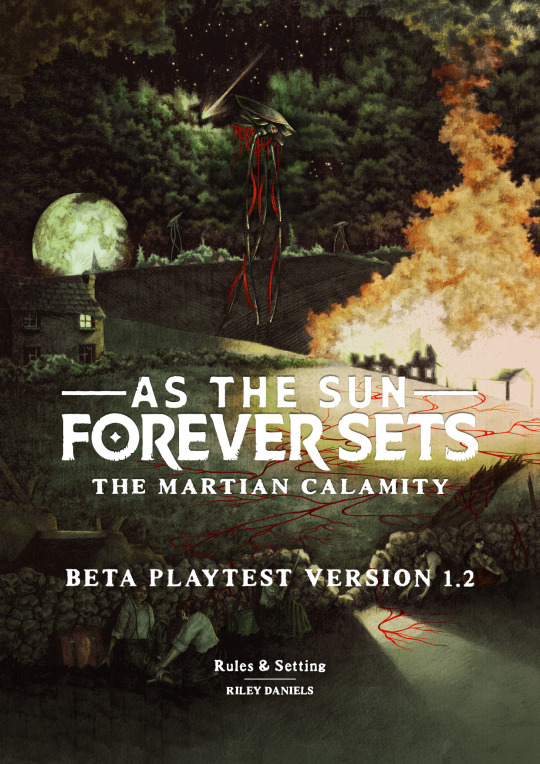
It’s nuts I’ve been working on this game for over 4 years at this point. As the Sun Forever Sets is for sure my biggest and most capital G Game. It even has a publisher and everything. It’s also my first game! Wow! It's been tough, though. We'll get into it!
Britain, 1899
As the Sun Forever Sets is a survival horror sandbox based on the War of the Worlds, utilises the Forged in the Dark ruleset, and is about ordinary people surviving a Martian invasion of Victorian era Britain. We play to find out how they rise to meet the storm of destruction, the ways in which it shapes them, and if they survive to see a new world emerge, or die amidst the rubble of the old.
In the last years of Queen Victoria’s reign, the British Empire stretches across a quarter of the globe, and under the guise of genteel progress and civilisation, it commits theft and murder on a global scale. Britain itself is on the verge of the modern era, the Second Industrial Revolution pushing people into the cities to drive the factories and forges owned by the greedy industrialist class. But beyond the common causes of humanity and unbeknownst to the men who impose their rule over it, vast wheels have begun their inexorable turning. Across 40 million miles of void, the Martian invasion hurtles Earthward. Screaming across the stars, instruments of annihilation unlike anything believed possible lie ready for assembly, alongside the Martians themselves. They are truly inscrutable beings, but their intent is as clear as it is terrible – they will suck the literal and figurative blood from the Earth, and nothing less than the complete and utter subjugation of humanity will be enough.
If this sounds cool to you... well, you gotta wait, it’s not done yet. Sorry! But you can come and hang out in the Sick Sad Games discord, where I post excerpts and occasionally organise playtests.
The Hard Times of (Old) England
Be warned, this is a long one - over 4000 words (if you don't have a Tumblr account, you won't get to the end before it starts bugging you to register one, so go read this on Medium instead.) It turns out when you work on a game for a long time, you have a lot to say about it. Strap in, grab your gin and laudanum, and let’s destroy an evil empire just by existing.
Thanks to the wonderful @hendrik-ten-napel for taking a look over my disorganised thoughts.
(Potential) Spoilers for: The Bear, The War of the Worlds, The Last of Us, Children of Men, Threads, When the Wind Blows, Amnesia: A Machine for Pigs, The Thing.
Roleplay in the Pre-Post-Apocalypse
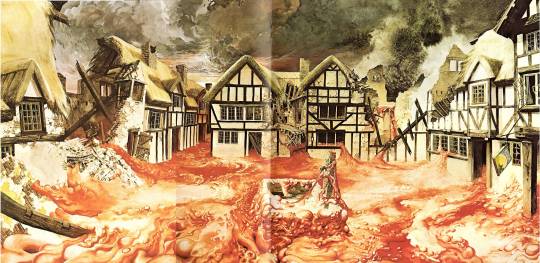
TTRPGs love a good post apocalypse. It's understandable - gas up and ride glorious on the legally distinct fury road, run a commune of like minded weirdos in the ashes of the old world, go digging through retro-futuristic ruins to find retro-futuristic treasures. Who wouldn't want to do any of these? But As the Sun Forever Sets is about an apocalypse as it begins, not after it’s over.
There's a lot of crossover, of course. There’s a focus on similar things - disaster and spectacle, relationships and trust, scavenging and survival. But the bonus of the world not yet being over, is that we get to roleplay out dealing with that terrible, inexorable reality.
youtube
HG Wells wrote a book about blowing up all the places he used to live, and it's a banger. I was surprised to find there wasn't a TTRPG based on the War of the Worlds, being the tantalisingly public domain ur-alien invasion story it is. As the Sun Forever Sets is very explicitly an adaption of it, to the point that before I came up with the name it almost got released as The War of the Worlds: The Roleplaying Game (lol). I'm glad I didn't, doing my own thing has meant both me and the people playing are way more free to fuck around without the expectation that it must adhere to a canon.
The book is good, strikingly modern feeling in parts, and obviously massively influential - so much science fiction can be traced back to our nameless Narrators tormentuous trek across the south of England. But Wells’ prose is typical Victorian - overly wordy and florid (any book that contains the word “ejaculating” meaning “to shout” might be difficult for readers who aren’t used to the style), so when it comes to recommending an actual adaptation, there’s only one true king. Whenever I bring up Jeff Wayne’s The War of the Worlds, the usual reaction from anyone outside of the UK is to say "... they made a what?"
My mom was very keen to get me into musicals, but nothing really stuck until she tried this, the secret best War of the Worlds adaption (sorry Steven Spielberg, but you were doomed from the start.) It's the bombast and drama you'd expect from a disaster film, the horror and pathos of Wells’ classic, all expressed through vivid narration and sick nasty prog rock - wailing guitar and crunchy 70's synths operating at full effect. It's not completely faithful to the book, it doesn't matter. It’s the best.
youtube
Ah yes, the film bro's favourite mid 2000's film. Did you see that sick oner? That’s six minutes without a cut, that means the film’s good right? Children of Men is a slow burn apocalypse, dressed up like a world that’s already ended. Plenty has been written about all the little ways the film is prescient about the state of the UK - the slow belly-crawl into facism and nationalist fervour, the particularly British decay and class divide exacerbated by the desperate times, even the willful ignorance and the explicit sense that everyone’s just given up, it’s all here.
All that thematic stuff seems like it’d be really relevant to As the Sun Forever Sets, right?
Unfortunately, we are in fact here to talk about the long takes. The unbroken moment-to-moment action scenes evoke The War of the Worlds to a tee. Theo navigates danger with the same fraught tactical tension as War of the World's Narrator - dashing between doorways, groping for an axe handle in the darkness, desperately trying to start a car as assailants sprint towards him. What’s the best way out of this situation? How do I get from here to where I need to be? He lives his life in rolling, fleeting 5 second intervals, because he’s forgotten what it means to think in the long term - about the future, and what it might hold.
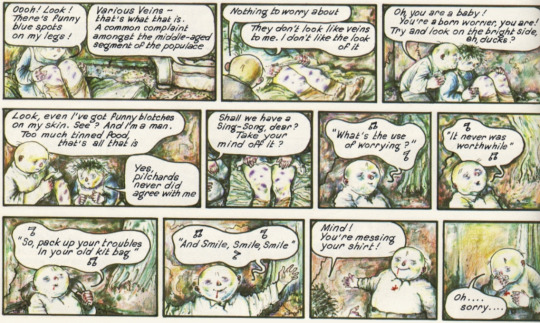
I was always fascinated and terrified by the idea of nuclear war. I guess it comes from watching a lot of 90’s disaster movies, but those are often ultimately fun romps where the day gets saved at the end, or at least the main characters find themselves alive and well at the end of the saga of destruction. Instead, As the Sun Forever Sets asks you to reflect on the horror and sadness present at the end of the world. Things are going to change forever, and change is always hard.
There’s not many clips of Threads and When the Wind Blows online, so it’s a little hard to demonstrate their particular nuclear inflected pitch black darkness. They’re grim - Grave of the Fireflies grim - differing in focus but united in their horrible impact.
When the Wind Blows is a story of an elderly couple living in rural England when the bombs drop, based on the comic by Raymond Briggs. Yes, The Snowman’s Raymond Briggs made a film about 2 lovely grandparents dying of acute radiation poisoning. Jim and Hilda are completely unprepared for what’s to come, their only reference is the Blitz - terrible in its own way, but not a patch on the scale of death they’re about to experience.
They survive the blast and wait for the good old British Government to arrive to save them, as it did in the 40’s. Slowly liquifying in the nuclear fallout, they hold onto each other and keep their spirits up, eventually making the decision to clamber into the paper sacks they mistakenly believed might protect them from the blast. Clutching their medical cards and birth certificates (for the ambulance, sure to be along any minute now), Jim mumbles painfully through a final prayer that morphs into a misremembered Charge of the Light Brigade, and they slip into a perpetual slumber together.
The most tragic part is Jim and Hilda’s unshakeable faith that their government is there for them - ready to catch them when they fall - borne out of Britain’s post WW2 renewal but absent in the 1980’s of the film’s plot, and the Britain of today. It’s a masterful film, shockingly sad, but the shock is the point.

Instead of aiming for your heart, Threads aims for the head. It’s a drama that aims to be as accurate as possible to government research into what a nuclear war might look like, plainly and forensically setting it out without any thought of softening these hard facts for its audience. Rather than focusing on a personal story, Threads flits around several groups of characters - minor government figures and ordinary families. Like Jim and Hilda, they too are woefully unprepared for the end of the world, and those in charge know there’s no way the UK could ever be ready for such a thing.
As mundane life is quietly intruded upon by news updates detailing far off geopolitics and the subsequent escalation that leads to war, the tension rises subtly then suddenly, like a spacecraft on the launchpad. People we’ve seen pottering about their normal lives are maimed and evaporated in the subsequent shocking nuclear exchange, whilst stark statistics flash on the screen - the hundreds of thousands instantly killed, how long the millions more fatally irradiated have left to live, the woefully inadequate tonnage of stockpiled food to feed those who survive. Each zero hits like a gutpunch.
And when you think the film must nearly be over, it keeps going. 1 week later. 1 year later. Threads grinds to an excruciating halt 13 years after the bombs fall, after year upon year of failed harvests from a destroyed earth barely able to support a population level equivalent to medieval Britain. At one point, mute children watch a warped and scratchy VHS of classic kids educational programme Words and Pictures on a TV powered by a steam generator.
The friendly presenter spells out the word “cat” through the thick veil of static, accompanied by a picture of one - an animal the children watching will likely never see. As they watch with blank, emotionless faces, the image of the cat fades to one of its skeletal form. “A cat’s skeleton” the presenter enthusiastically intones. The unrelenting bleakness might feel like a punishment, but Threads doesn’t mean it to be. This is just what would happen, after all.
Love in the time of the Heat-ray
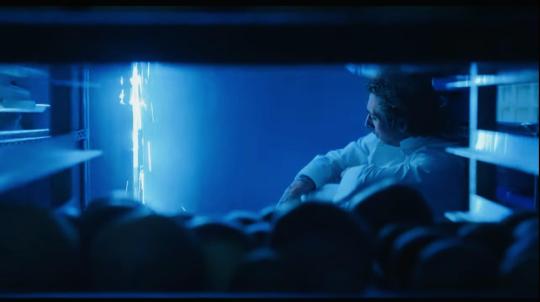
In fact, someone in a Reddit thread said As the Sun Forever Sets “wasn’t just endless misery” and I’m glad that comes across. I wanted there to be moments of tenderness, quiet joy, anger, frustration, love and loss to punctuate the action and the horror.
People are messy and complicated even at the best of times. Under pressure, this is amplified a thousandfold - a little crush becomes a whirlwind romance, small disagreements become full blown fights, and not fully understanding someone might transform them into an enemy in your head.
youtube
The little town Bill conspires to be left alone in ends up comparatively untouched by the horrors going on elsewhere, as untouched as anywhere can be in The Last of Us. He hated the world anyways - so he isolates himself as he prepares for it to end, and it makes sense that his life only really begins as the show does. When Frank arrives, Bill is forced not to just engage with the broader world outside of his little enclave, but in the act of truly living in it.
There’s no prepper’s guide to romance. A human heart can’t be field stripped for maintenance. By choosing to exist as a vulnerable, emotional being, Bill opens himself up to a different kind of apocalypse. Frank becomes the flowering vines that slowly crack the flat concrete wall of a world that Bill created, and when those vines die, the wall can only crumble. It’s so fraught and lovely, delicately yet absolutely gut wrenching. At least their apocalypse was one they decided to have together.
“I’m old. I’m satisfied. And you… were my purpose.” - "Long Long Time”, The Last of Us
youtube
While several of my TTRPG writing friends were gushing about how great The Bear is, Em Acosta, author of the wonderfully inspirational Exile pointed out something super interesting - a lot of the show is about how you deal with people you’ve found yourself stuck with. No matter how much they piss you off, or whatever they do wrong, there’s something that means you can’t ever let them truly exit your life. They’re there, like it or not, until the bitter end.
Turns out this is very similar to how As the Sun Forever Sets handles Player Character relationships. In both it and The Bear, nothing’s ever truly resolved between characters - every relationship is like a cooking pot perpetually simmering. You might’ve apologised, made a truce, or just ignored your issues for so long that they seem to disappear, but no matter what, you’ve got to keep your eye on that pot.
Because suddenly a crisis will hit, and someone says something, or a diceroll comes up bad and all of a sudden the pot boils over and things are once again fucked. You storm out, start screaming, throw a fork. Even in the worst case scenario where a Character leaves because they’re absolutely sick of the rest of the group, they might show up at the end of the game for one last scene. Who knows how you’ll all feel at the end - nothing is ever truly fixed, and only the dead are truly broken.
“I quit, chef, is what’s going on. You are an excellent chef. You are also a piece of shit. This isn’t on me. Goodbye." - “The Review”, The Bear
youtube
I’ve talked about The Thing a little before, John Carpenters sweaty, paranoid antarctic masterpiece. Along with the incredible effects and the (mostly) restrained use of action and bombast, the thing that makes... The Thing work is that the staff of the stricken research base lack any and all emotional intelligence.
It’s sort of the ultimate reverse Dudes Rock movie. Nobody knows anything about each other, so when their bodies and minds are colonised by the titular chameleon from outer space, they’re just another stranger to the rest of the crew. I’d ask you a question only you would know the answer to, but uh.. I don’t know anything about you. Whoops!
Over the course of the film, the whole operation falls apart as they try their best to work together to deal with the alien interloper, but their complete lack of ability to trust or relate to each other - present even before the crisis they find themselves in - is their ultimate downfall.
That final excellent shot of MacReady and Childs sat in the snow at the end of the film as their compound burns around them is the subject of a lot of unnecessary theorycrafting youtube videos, which kind of misses the point. Each suspects the other, but ultimately it doesn’t matter if one of them’s a Thing. One stranger is the same as another. Why bother getting to know each other now?
“Well...What do we do?” “Why don't we just... wait here for a little while? See what happens.” - Childs and Macready, The Thing
Science Fiction Revenge Fantasy

I’m not a historian, but the parallels between 1899 and now are pretty plain to see. Increasing class disparity, a lack of political will to help those in need, rampant cronyism and profiteering. As long as you’re in the place for it, roleplaying in a fictionalised version of the past to air out the issues of the present can be super fun and cathartic. You’re not expected to get a degree in British history to make it work, either.
The title is a play on the phrase “The Sun Never Set on the British Empire”, and it’s plainly stated in the book that Britains Empire acted as a mechanism of genocidal oppression, and that the Martians are here to end it - intentionally or not. It’s appealing as a premise on the face of it, but it goes a little deeper. Memories of Empire echo across time in Britain like the ringing of a malevolent bell, a cause celebre for braying Tories and fascistic right wing cunts (two very close circles in the venn diagram.)
We used to be a great country before this woke nonsense. Things were better back in the old days. The DEI contingent is trying to destroy our noble past. Yada yada yada, fuck offff. I’m sure someone somewhere will accuse me of “wokewashing” the past for including explicitly trans and queer characters as part of the book, along with the historical facts around how we fit into the oppressive Victorian conception of sex and gender. Unfortunately for them, we’ve always been here.
To be a little pretentious about it, every game of As the Sun Forever Sets reaches back into the past and cuts the myth of a glorious and benevolent Empire, and the good old days enjoyed within it off at the neck, purely in the act of beginning one. That sparks a little joy for me. Destroying a racists dream is fun, even if it’s only in the abstract.
youtube
A horror game about the most literalist Victorian industrialist imaginable hearing the phrase “Eat the rich” and getting right on that. I’ve not played Amnesia: A Machine for Pigs despite fond (??) memories of playing The Dark Descent in a room full of jumpy friends, and seeing Dear Esther played live on stage, with a live orchestra and narrator - an exquisite way to experience that game.
The mechanical chops of Frictional Games mixed with the narrative verve of The Chinese Room, how could this game be anything less than incredible?
After The Dark Descent I fell off’ve the “scary guy chases you around” genre of game until Alien: Isolation revitalised it, and the reviews of A Machine for Pigs were mixed - kind of boring, middling gameplay, too dark - so I never went back. I was planning on writing a little about its vibe - dark, gothic Victoriana that rhymes nicely with As the Sun Forever Sets - but after a bit of research, Mandus’ quest for his missing sons strikes an unexpectedly resonant and terrible chord.
The writing and voice acting is phenomenal, Mandus’ split consciousness - the self you play and the other half of him that’s seen the horrors of the forthcoming 20th Century and is compelled to act, imbued into the myopic machine he built - is extremely compelling. He feels compassion for the poor and wants to save them, but they fill him with fear and disgust. He knows the industrialist class is killing the world, but feels a deep shame in the fact that he counts himself amongst them. So his machine grinds the rich into meat for the poor, who it distorts into grotesque pig homunculi and forces them to operate the machine’s inscrutable workings.
It’s Mandus’ twisted way of saving the world - kill the rich for their crimes, enslave the poor for their own good, all hail the new machine/god/manager of the 20th century. It’s a neat reflection of the way modern politicians contort themselves to the whims of big business and AI snake oil salesmen to avoid doing the simple and obvious things that’d better the world. It’s a nightmarish refutation of Victorian Liberalism, that only the upper class know how to fix the problems of the lower class. It’s brilliant, and we should play it.
"Do you hear me Mandus? This is what you planned! This world is a machine! A Machine for Pigs! Fit only for the slaughtering of pigs! Whores, beggars, orphans, filthy degenerates. Pigs all. But I will purify the streets, cleanse this city, set the great industry free. I will clean the world, make it pure." - The Machine, A Machine for Pigs
Song of the Year, of the Century
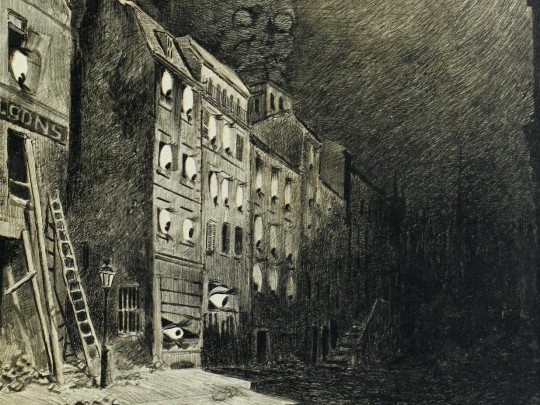
Not long after I came out as trans, I was asked what (in an ideal world) would make transition easier. I replied - never having to leave the house. One day I'd shut the front door as a man and another day, months or years later, I'd open it again as a woman, neatly sidestepping the terror of being perceived in a notoriously transphobic Britain.
In 2020 I shut that door and didn't open it for 4 months. At work, I remember calling the nearby shelter to donate our excess hand sanitizer and toilet roll, figuring out at the last second how support workers could take calls from their already isolated clients via their mobile phones, and fixating on the steady stream of scared coworkers leaving early. Tearfully, I felt the urge to hug those that remained as we locked up, before we remembered we probably shouldn't.
I've never been more aware of the minutia of moving through a space on the way home - How many people had their hands on this handrail? Have I touched my mouth or eyes without realising? Is anyone in the office already sick? Or on this train? How many more people are going to die? - My heart was in my chest, I heard the blood whoosh through my head to the beat of my steps on the pavement. At home, I realised my boyfriend had to go into work the next day. After he went to sleep, terrified he might die, I cried.
"I remember I felt an extraordinary persuasion that I was being played with, that presently, when I was upon the very verge of safety, this mysterious death—as swift as the passage of light—would leap after me from the pit about the cylinder, and strike me down." - "The Heat Ray", The War of the Worlds
Writing As the Sun Forever Sets was my way of coping with the disconnect with the world I felt, the fear of both Covid and the rising transphobia kept me inside even as the lockdowns eased. That feeling of throbbing death creeping at the window took a long time to wrestle under control, and getting deeply obsessed with a big project became part of that process. It seems incredibly maudlin to make a TTRPG dealing with darkness and death during a pandemic that killed (and continues to kill) millions of people, but I suppose I’m kind of a maudlin person.
youtube
“I haven't written a song in a month, So I'm playing the same chords again. I know I need to get lost in the moment, But I get lost before it begins. Fingers stretching out into space. Reaching as a thought slips away.”
It also burnt me the fuck out. After years of constant work and testing (beginning long before Evil Hat picked up the game), I ran out of steam. I spent the months after Evil Hat’s public playtest ended not really able to write anything ATSFS related at all. The game kind of froze - I knew what I wanted to change or fix or add, but the moment the google doc opened I couldn’t make myself start typing. It was incredibly frustrating to have the switch flip from endless obsessive writing to constant nothing, and I don’t think I truly recognised the burnout I was feeling until recently. It turns out spending years staying up past midnight writing is bad, who know!
youtube
A lot of Forged in the Dark games don’t get finished (or more accurately, get stuck in perpetual development), something that the excellent and dearly missed +1 Forward podcast recognised in their episode collecting their thoughts on the FITD games they looked at back in 2021. I think that’s because, at least to me, writing a Forged in the Dark game is like trying to hold a plate of spaghetti without the plate. It’s deceptively simple at its heart, but the system squirms when you poke at it - write one thing and it affects 3 other things. Tug one piece of pasta out and you lose a meatball without realising it.
When I listened to that episode, I took it as a challenge. Part of me now wonders if it was a curse. I'm being hyperbolic, of course. But a little part of me did think it might be better to give the game up.
That’s not going to be As the Sun Forever Sets' fate, thankfully. Evil Hat has been there to support me when I’ve felt guilty about shifting another deadline or replying to a check-in email with another late “Not much progress this month, sorry!” The frozen writers block is thawing, and I’m so tantalisingly close to finishing the final text. This blog is part of that process, another chip in the icy dam.
The wheels of dread Martian terror turn once again, and it feels good. Part of that is down to not beating myself up about a lack of progress. The more important part came when I realised I felt able to return to the world again - living in it, not hiding from it. Staying connected to it, even when there's times I'm not able to inhabit it physically. Covid, Britains particular brand of transphobic brainworms, and the shadow of Empire all continue to exist, and so do I - a weird maudlin transsexual woman - in spite of them all.
“The day seemed, by contrast with my recent confinement, dazzlingly bright, the sky a glowing blue. A gentle breeze kept the red weed that covered every scrap of unoccupied ground gently swaying. And oh! the sweetness of the air!” - “The Stillness”, The War of the Worlds
You made it!
Thanks for sticking with my messy thoughts. If what I talked about here sounds cool to you, please stop by the Discord, we'd love to have you. Look forward to seeing As the Sun Forever Sets come to a crowdfunding platform of Evil Hat's choice (I assume backerkit) at some point in the future ♥.
#ttrpg#indie ttrpg#forged in the dark#horror#war of the worlds#ttrpg design#science fiction#incredible self indulgence#as the sun forever sets
72 notes
·
View notes
Text
On Diomedes of Argos.

Typically, when people think about their favorite heroes of the Trojan siege, they think of the likes of Achilles, or Odysseus, or even Agamemnon (or if you’re based, Hector.) And while these are all valid to whatever extent— because let’s be real, no one is choosing favorites based on who has the purest moral standpoint— they’re not exactly remembered for the noblest of reasons.
Achilles spends half of the Iliad inside his tent as a sulky burrito, and the other half slaughtering Trojans and crying over the consequences of his own actions. Odysseus is a chronic liar, and Agamemnon is Agamemnon. But at the end of the day, they’re still remembered (for better or for worse, really.)
Though, on the topic of Homeric heroes, I feel there is one who is often overlooked despite achieving great feats over the course of the epic; Diomedes of Argos. (Note: arguably the most metal of the Achaean heroes at Troy.) So, let’s rant talk about him!
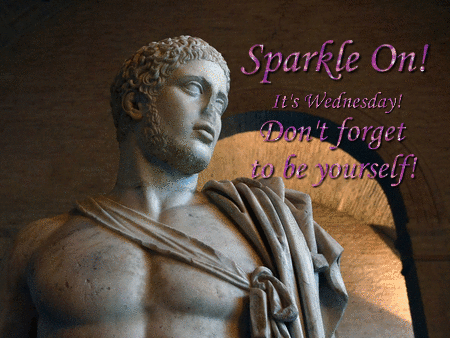
Diomedes was one of the key players in Homer’s Iliad— a recount of the last year of the Trojan siege. Being summoned to fight under oath, Diomedes headed his fleet of 80 ships to Ilium. As well as having a whole chapter dedicated to how kickass he was [read more about that whole thing here], the king of Argos was also a master strategist, and extremely noble— not just in his war efforts.
For example, there are multiple points in the Iliad where he checks the leader of the Trojan expedition, Agamemnon, calling him out on his cowardice or for otherwise being an inadequate leader, [Book 9; ‘Agamemnon, I will begin by taking issue with you over your proposal… do you really believe the Greeks are the cowards and weaklings you say they are? If you for one, have set your heart on getting away, then go.’] [‘Zeus has granted you many things… He gave you the sceptre of power and the honour that comes with it, but he did not give you courage— and courage is the secret of authority.]
And one instance where he truces with the Trojan hero, Glaucus— both of them exchanging armors (on an active battlefield, btw) to honor the fact that their grandfathers had been allies, [Book 6; ‘So let us avoid each other’s spears... And let us exchange our armor so that everyone will know our grandfather’s friendship has made friends of us.’]
He is also one of the only soldiers in the war who avoids committing hubris in the entire epic, which is probably the most telling of all his virtuous traits.
Diomedes also has a proverb named after him! ‘Diomedean Necessity/Diomedean Compulsion', which basically means when someone does something for the greater good (despite the reluctance of the person in question.)
This is taken from the myth of Odysseus and Diomedes taking the wooden statue of Athena— dubbed the Palladium— from Ilium. During this heist, Odysseus tries to stab Diomedes in the back to steal the acclaim of taking the Palladium for himself.
Rather than punishing Odysseus on account of betraying his ally for personal gain, Diomedes ties him up and drags him back to camp instead, because he knew the Greeks couldn’t win the war without Odysseus’ wisdom.
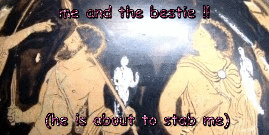
Anyway, why the rant? Sure, I could sit here and convince you that he’s the coolest Greek hero, but what would I be trying to accomplish in doing so? Well, it’s simply because while every other Homeric hero is recognized and represented in modern media, Diomedes isn’t.
He wasn’t even mentioned once in Troy (2004), the film adaptation of the Iliad! Despite him being the focus of multiple chapters in the book, as well as playing a big role in the Achaean army’s over-all victory.
I’m sick of everyone (and by that, I mean most modern media) depicting him as though he was just some dude™ in the Iliad when he was actually (from a mildly biased standpoint) one of the best of the Achaeans at Troy.

TLDR; Diomedes of Argos = Based. He solos ur favs (probably. He almost killed Ajax the greater at Patroclus’ funeral games 💀)Put him in more movies/shows/games so me and the other two Diomedes fans can be happy.



#tagamemnon#greek mythology#greek epic#homeric epics#the iliad#diomedes of argos#i didnt get to talk about him on the battlefield for the sake of the word count#BUT HE WAS A BEAST#i think he got the most kills in the book ??#insane.#dont even get me started on all the roman cities he founded#UGH what a guy#are these enough glitter gifs to boost my grade owen
67 notes
·
View notes
Note
i got intrigued by the fact that you did a senior paper on the witches from madoka - can you please tell us some more about that? i love when academic work ties to personal interests.
I can do you one better. You can just read it. Screenshots as it’s from a website. This is the actual final. I can’t include my analysis portion in an image because there’s a ten image limit on mobile. So it’s under the cut. And please be gentle, because I wrote this when I was 18.
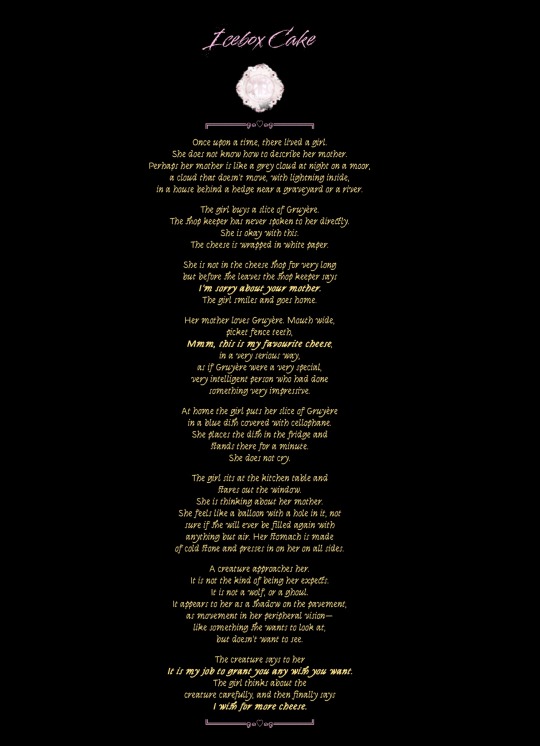
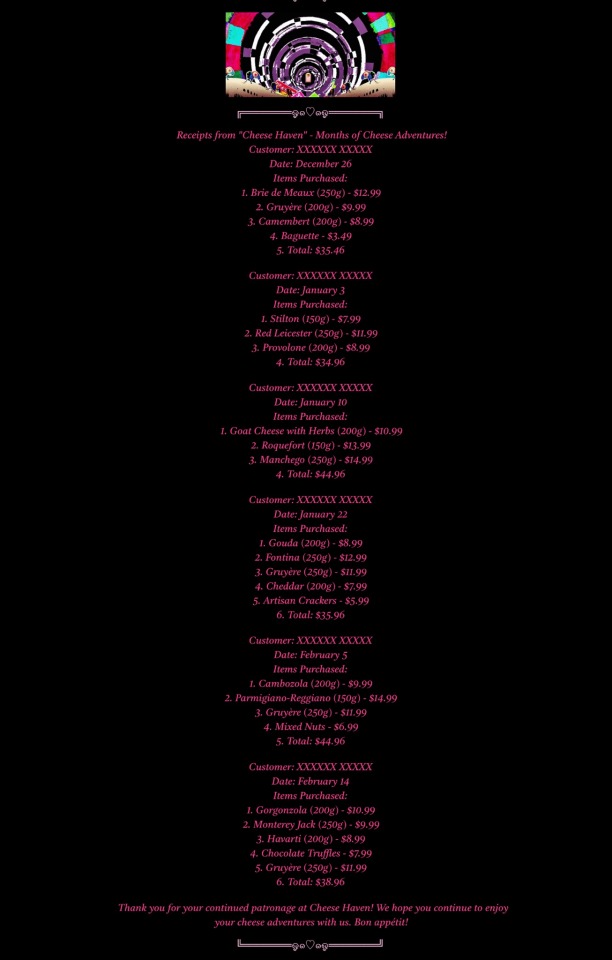
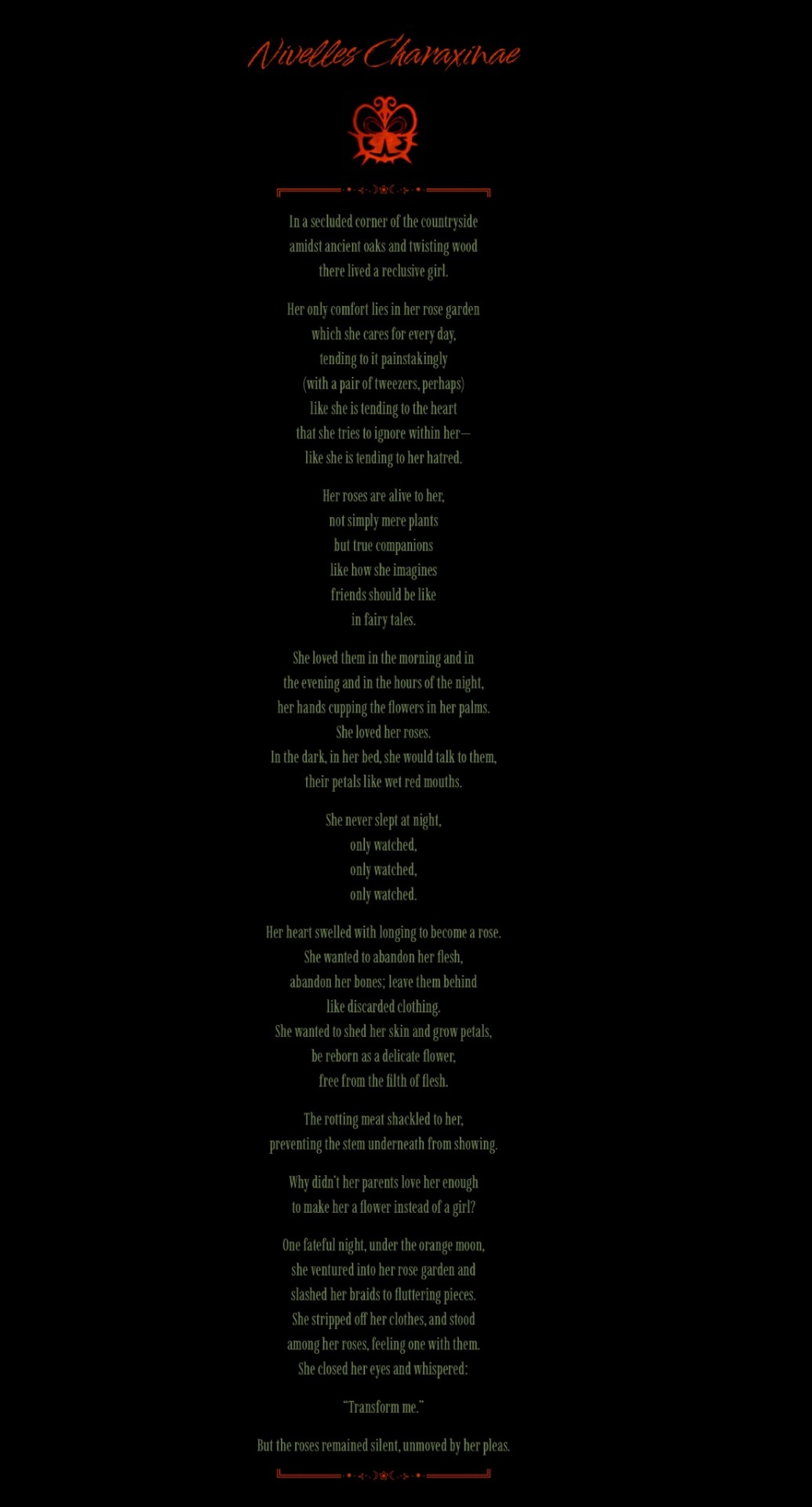
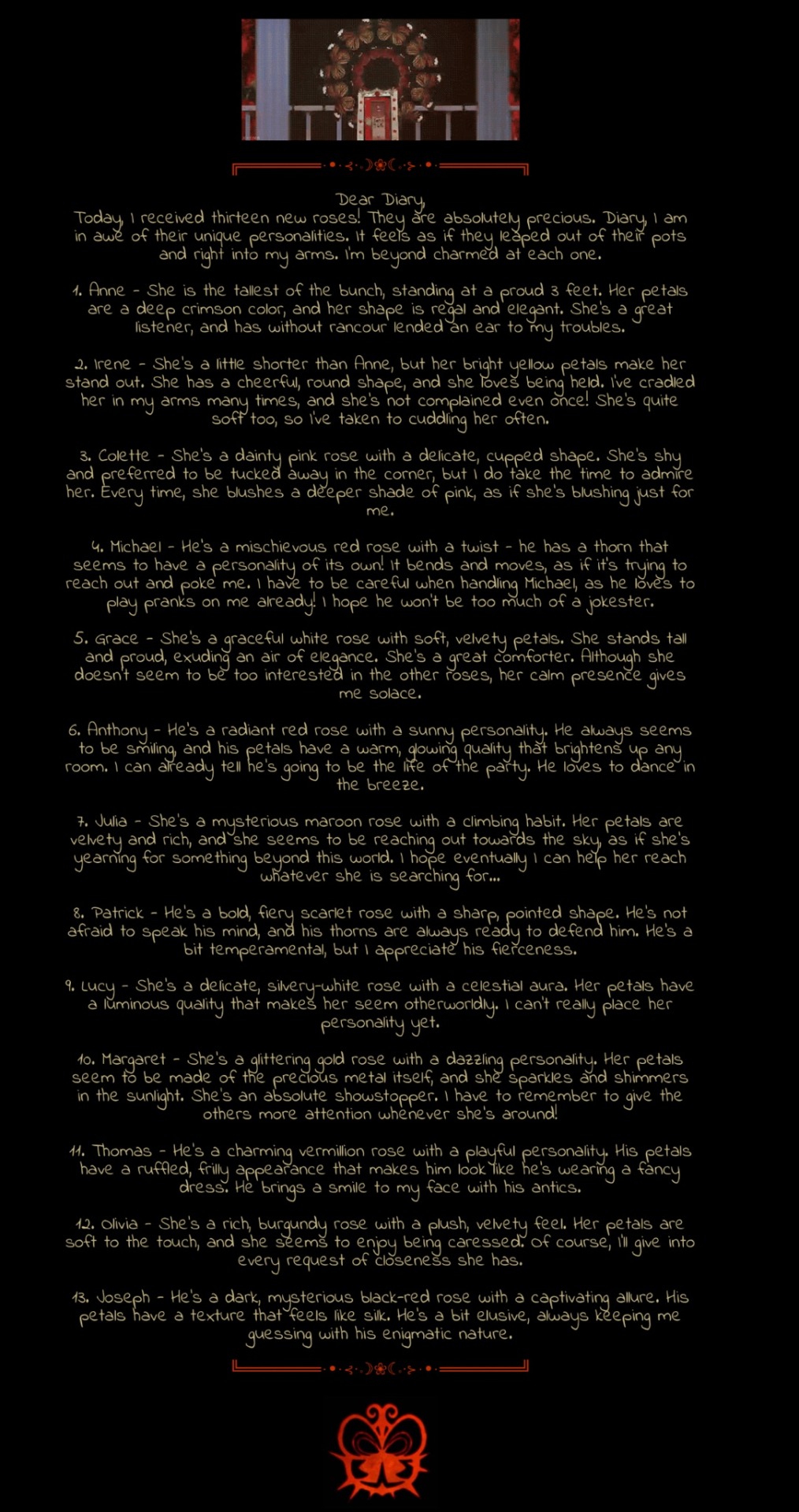
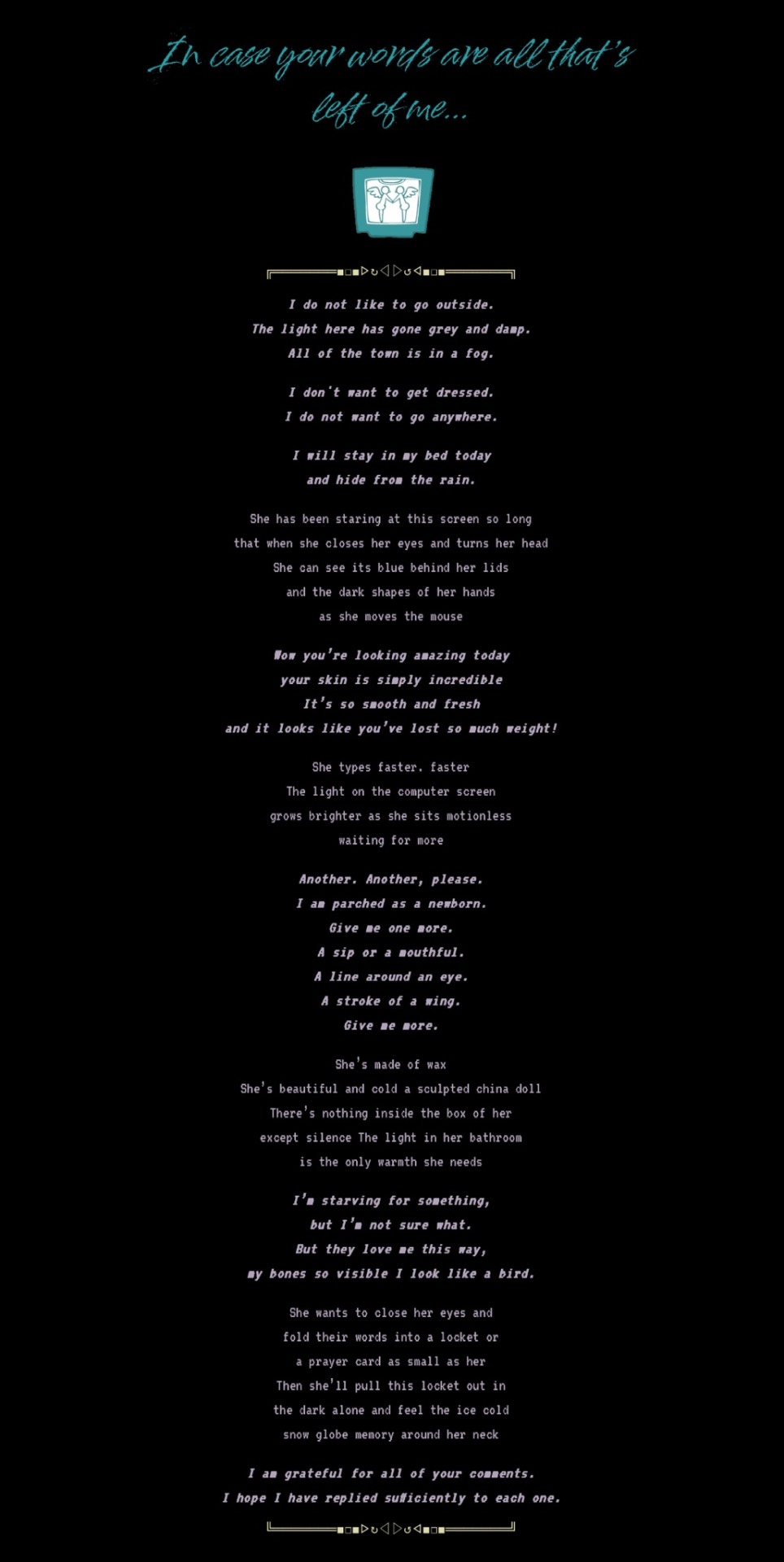
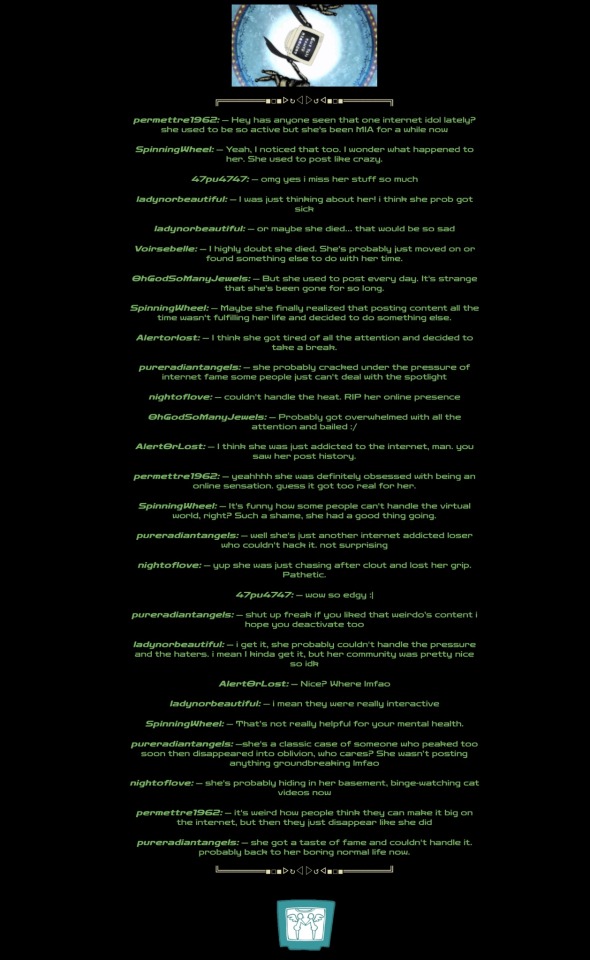
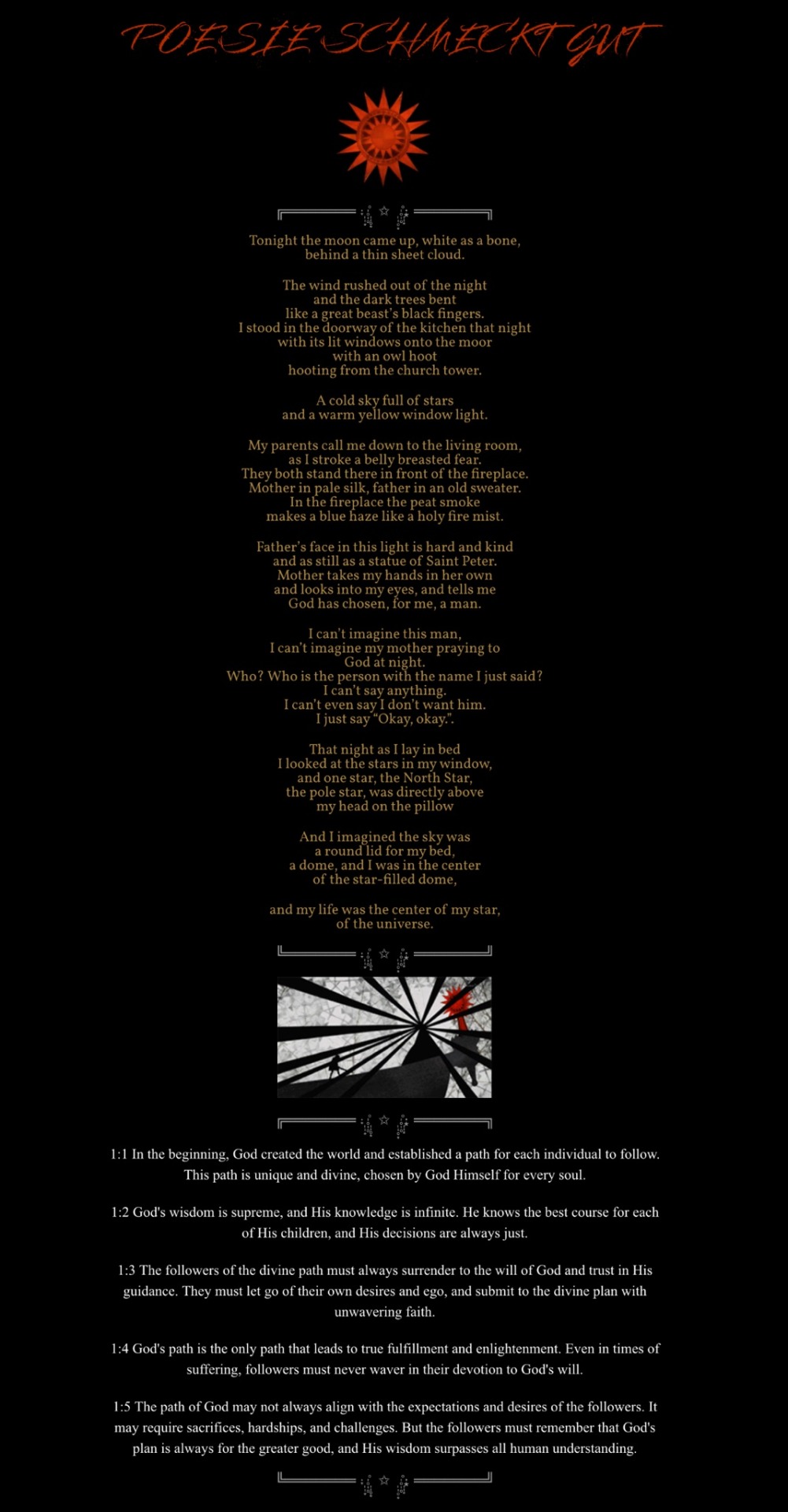
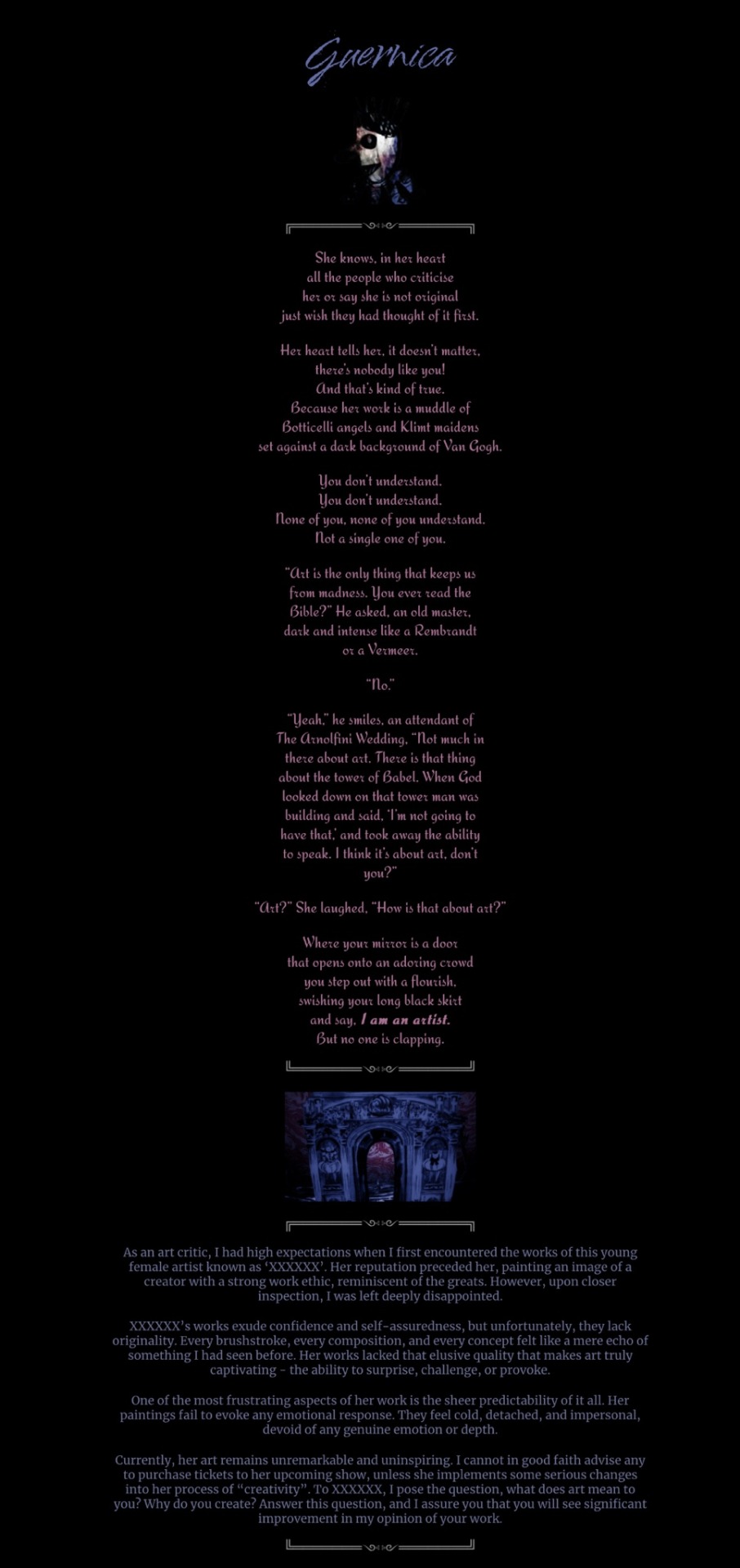
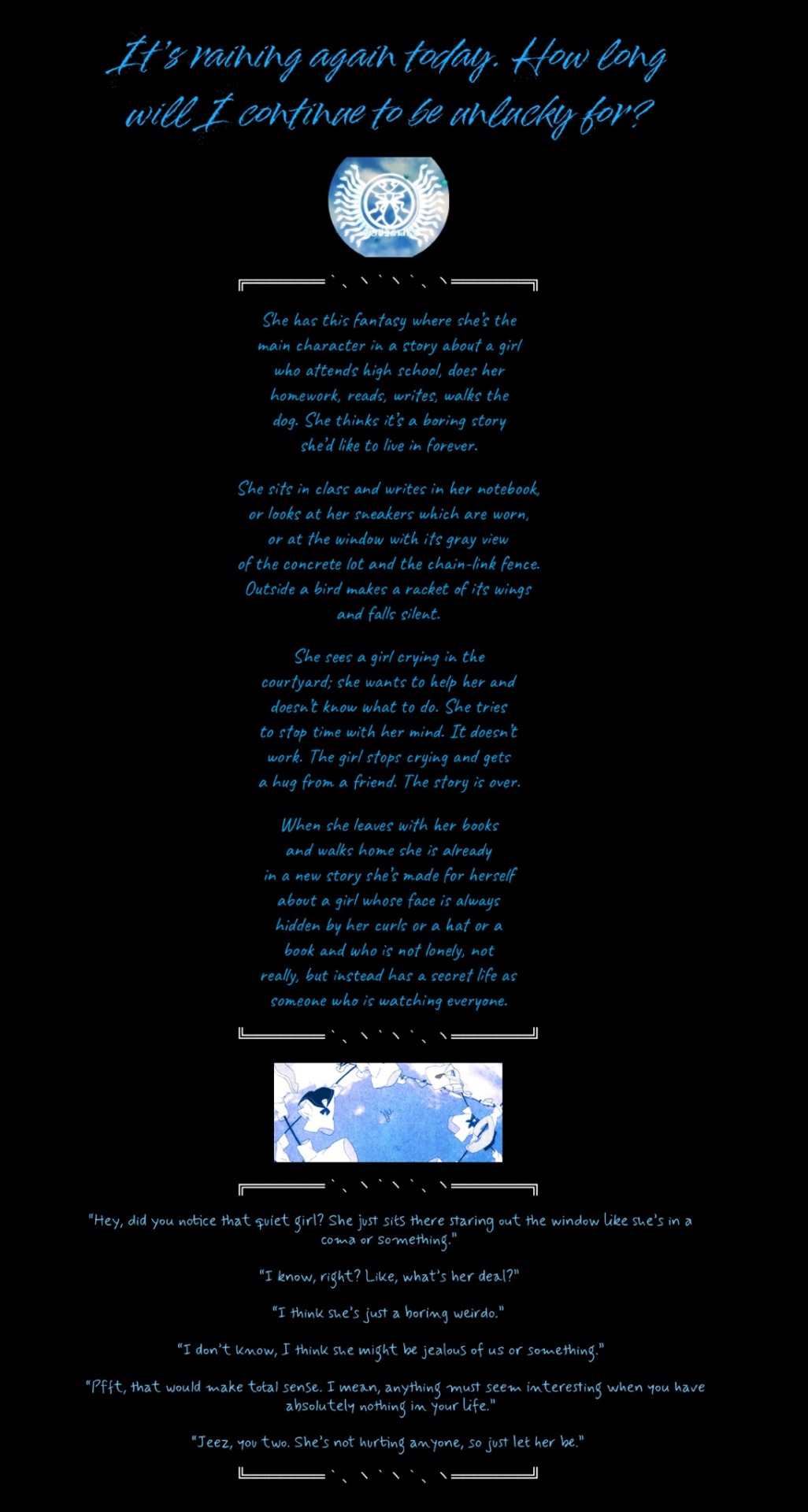
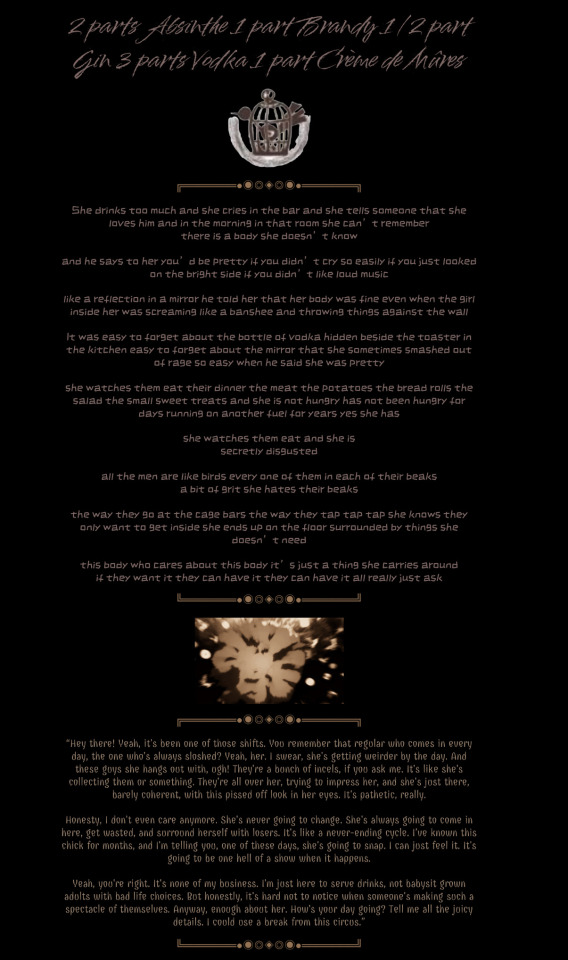
Icebox Cake
Icebox Cake is the alternate name for the pastry Charlotte. This is of course a reference to the witch Charlotte, who the poem is about. This story is a direct adaptation of Charlotte’s canon backstory as revealed in the Magia Record Game. Charlotte is the only witch in this collection with a concrete backstory, and the only one who we know the real name of — Nagisa Momoe.
Nivelles Charaxinae
Nivelles Charaxinae is a reference to both this witch’s namesake and her design. The witch this story is about is Gertrud, named after the saint of gardens, Gertrud of Nivelles. Charaxinae is a reference to the type of butterfly that is in Gertrud’s witch form. The names of her roses in her diary entries are names of saints. I wanted to give her roses human names to show they are the true ‘humans’ to her, but also maintain a degree of disconnect. I think like Gertrud’s namesake, saints are the least human human you can be.
In case your words are all that’s left of me…
In case your words are all that’s left of me… is the only poem with a completely made up title. Though I want the ending of what happened to HN Elly, the witch of this story, to be up to reader interpretation, her feelings of having no real presence besides her online one was something I wanted to make very clear, so that’s why I chose this title.
The usernames are all references to songs sung by Marguerite in Faust. Faust is a work with immense impact on Madoka, having numerous references both visually and story wise. Most notably, quotes from it are littered in every witch labyrinth. Keeping with the theme of this poem being the odd one out name wise, HN Elly actually has another name— Kirsten. This is after Dorothy Kirsten, who famously portrayed Marguerite, which is why I paid tribute to her role.
POESIE SCHMECKT GUT
I based most of my references off the real life women the witches are named after. It shows most in POESIE SCHMECKT GUT. The namesake of this story’s witch, Elsa Maria, is Elsa Asenijeff. POESIE SCHMECKT GUT was a publishing firm for one of Elsa’s books. The base storyline is based off of Elsa’s unhappy arranged marriage, and the religious and star theme was already there in Elsa Maria’s labyrinth.
Guernica
This poem is all about visual art from the point of view of a girl who doesn’t really understand it, so I was a perfect person to write this. All the references were surface level, sort of awkwardly shoved in ones to famous pieces and artists. The title is reference to one of Piccaso’s most famous pieces, an extremely meaningful and striking abstract about war. For this witch, who is named Izabel, who does nothing but copy others, I couldn’t think of anything better to name her story, because I knew she herself could never find value in Guernica.
It’s raining again today. How long will I continue to be unlucky for?
There’s not a lot to say about this one, but I think the witch that it’s about, Patricia, would like that. The story is pretty self explanatory, but it’s one of my favorites because of that. The title is reference to a line in her labyrinth.
2 parts Absinthe 1 part Brandy 1/2 part Gin 3 parts Vodka 1 part Crème de Mûres
This witch, Roberta, is pretty special. First off, she’s an adult witch, the only in the series. She’s said to be fond of alcohol, which I tried to portray in the lack of grammar and punctuation, like you’re listening to the incoherent thought stream of the intoxicated. The title is the ingredients to her namesake, the Aunt Roberta cocktail, which is the strongest drink in the world.
Source Title: Puella Magi Madoka Magica
Source Creators: Atsuhiro Shinbo & Gen Urobuchi & Shaft Productions
Year Published/Produced: 2011
Setting: The series mainly takes place in the fictional city of Mikakihara Japan, 2011. The rest of the series takes places in the otherworldly “Labyrinths”, dark mental landscapes based on the inner feelings of the witch they belong to.
Plot Summary: The series follows a middle school girl named Madoka Kaname, who is approached by a creature named Kyuubey to grant her any wish in exchange for becoming a “magical girl” and fighting against witches— supernatural creatures that kill humans. Eventually, it is revealed witches are fallen magical girls who fall into despair and that Kyuubey purposefully creates this magical girl to witch cycle to feed off their sadness, as his species uses said emotion like energy to fight otherworldly creatures far away, to prevent the destruction of the universe.
In the end, Madoka becomes a magical girl to wish for all magical girls to get happy endings— which erases witches from existence, including herself, as all Magical Girls eventually become witches. This creates a paradox through which no one remembers her anymore, except one person, the girl who had wished for her not to live a normal life more than anyone.
Key Character Descriptions
Charlotte— The witch of sweets, it is her nature to be tenacious. Charlotte used to be a ten year old girl named Momoe, who became a witch after falling in despair at the death of her mother.
H.N. Elly— The box witch, it is her nature to be covetous. Her labrynth and cards all imply that she was an internet addicted shut-in turned internet-famous idol, who cracked under the pressure of constant performance.
Elsa Maria— The shadow witch, it is her nature to be self-righteous. Due to her religious imagery, many theorize she was driven to despair after finding out the witches she slayed as a magical girl used to be fellow humans. However, I based my story on her on the life of her namesake, Elsa Asenijeff.
Gertrud— The rose garden witch, it is her nature to be distrustful. Nothing is known about her backstory, so I constructed my adaptation for her based on the info we do know about her, such as the fact that “she holds roses dearer than anything else” and that, “she loathes the thought of humans trampling her labyrinth”.
Patricia— The class representative witch, it is her nature to be an onlooker. It has been said she used to be a normal, serious girl who was overlooked by her classmates. In the show, her wish is for her school life routine to go on forever, which is what I based my adaptation for her on.
Izabel— The artist witch, it is her nature to be vain. In her prior life, she was an artist suffering from a creative block who yearned for others to notice her. It is said that every art piece she produced was something “that you have probably seen somewhere before”.
Roberta— The birdcage witch, it is her nature to rage. Before she became a witch, she was a party girl living a life of surface level relationships, specifically with men, but secretly, she was disgusted by all of them. Her wish was for friends who wouldn’t dislike her.
Cultural Themes
The fear of being alone is a major theme in Madoka Magica, as depicted through the struggles of various characters. Sayaka Miki's desire to win the affections of her crush, Kyousuke, despite his lack of care for her efforts, highlights her fear of being unloved. She becomes obsessed with trying to gain his love, ultimately leading to her downfall.
In a more subtle way, Mami Tomoe's yearning for companionship also highlights the theme of fear of being alone. Despite her cheerful and big sister-like front, Mami is revealed to be deeply lonely and craves companionship. She reaches out to other magical girls in an attempt to alleviate her loneliness, but her efforts are paid in dust.
And of course, the biggest example of this is Homura Akemi's refusal to let Madoka die. Homura goes to great lengths to protect Madoka, trapping herself in a time loop to prevent Madoka from becoming a victim of the magical girl system. Her actions are driven by her fear of losing Madoka and being left alone in a world without her, to the point where she would even let the universe itself be destroyed to save her love.
Through these characters, the series explores the visceral human need for connection, and the disastrous consequences that arise from the lengths we will go to to obtain it.
The central message I want to explore in my adaptation is the prior lives of monsters. Through these stories of monsters before they "became" monsters, I want to delve into the idea of how the creatures of Madoka Magica, framed as so inhumane the literal art style changes for them, used to lead extremely human, flawed lives before the show portrayed them. Using a simple, fairytale-like style of writing and multiple types of writing, like receipts, reviews, and diary entries, I want to portray the mundaneness of their lives, and just how involved in the world they were. That they were real little girls, with real lives that impacted the things around them.
Motifs
The most common motif in Madoka Magica is fairytale motifs, specifically Eastern European fairytales. Witches, little girls tempted by strange creatures, candy houses. One character, Sayaka Miki, even has her entire story based on the little mermaid. She loves a boy, he doesn’t love her, she sacrifices everything for him anyways and then turns into a huge, mermaid monster. I aim to invoke this through my style of writing, taking a simple yet whimsical approach.
Why Madoka?
I like almost everything about this anime. The characters, the love they have for one another, the Czech fairytale-like art style, and that despite the dark themes, the story never supports falling into the darkness yourself. One thing I dislike is that the short 12 episode length, while making the series very “complete” also serves to stunt the potential of a majority of the characters. As the series relies on the connections these characters have, it would have benefited very extremely from a longer run-time to show us the chemistry between the girls and their loved ones, as the lack of screen time can make these deep bonds seem rushed and superficial. I want to try to convey the importance of those deep bonds in my work, but like I said, it’s a matter of time, not passion, so my adaptation can’t fix this issue.
Adding sequels and prequels has, in my opinion, sullied the impact of the original work. Madoka Magica is an intensely popular brand, and thus, is extremely profitable. Making spin-offs for the short series seems obvious from a business point of view. But a majority of these spin-offs are just made simply from this business point of view, and nothing else. One example of this is the most popular spin-off series for Madoka, "Magia Record," which takes place in the same universe with a new, expansive cast of characters. The show feels like a cheap imitation of the original series. Instead of trying to explore new interesting themes or go into depth on the topics brought up in Madoka, it’s just trying to recapture what made it so special without truly understanding why it was so special in the first place.
One of the primary cultural fears explored in Madoka Magica is the fear of death, specifically the death of the ones you love. At the end of the series, it is revealed that Madoka’s aloof best friend, Homura, is actually in love with her and has been stuck in a time loop trying to prevent Madoka’s death, which proves unavoidable. The finale deals with Homura stopping the time loop and accepting her crush’s death, and that the world will move on without her, and so should she. The series tells us death is natural, it happens to all of us, and we cannot stop it. But we can honor the ones we loved and lost and step into the future as they would want.
56 notes
·
View notes
Note
what is cosmere? (is that what its called?)
The Cosmere is a big, interconnected fantasy universe that is the setting of most of the works by the author Brandon Sanderson. The cool thing about his books is that each series is contained to its own world, and you can read any of them in isolation without realizing you're missing anything, but if you read them all you get a sense of the larger plot happening behind the scenes as those worlds start to collide and things cross over.
Brandon's magic systems tend to be very rule-based and well-defined, with a lot of twists being characters finding interesting ways to use those rules of magic. This lends itself well to the crossovers, because all the magic systems (as different as they are) share the same underpinning principles.
Here's some quick rundowns of different series and standalones in the Cosmere:
The Stormlight Archive
Planned ten-book series, currently four books are out.
A massive sprawling epic about the world Roshar, that's hit by a hurricane about every four days, and all the life has adapted to survive that environment. Knights Radiant -- superpowered individuals with a close bond to a spirit -- are starting to re-emerge in the world after being absent for centuries.
Because there are so many characters, this is where a lot of the character fandom tends to focus their efforts. I wouldn't recommend starting with it, though -- the first book alone is a thousand pages. I'd wait until you have a sense of Brandon's writing. But it's very good.
Mistborn
One trilogy (completed), one tetralogy set a couple hundred years later (completed), two trilogies some time in the future.
One cool thing about this series is that it follows one world (Scadrial) from a vaguely Renaissance tech level in the first trilogy, to 1920s in the second series, and eventually 1980s in the third and space-age magic in the fourth.
The magic itself is very intricate and all woven around metals -- there are people called Metalborn who can ingest metals and burn them in their stomachs to get different effects, including super-senses, strength, and Magneto-ish metallokinesis. That last bit makes the gunfights in the second series particularly fun.
The first book is a heist novel about robbing a thousand-year-old God-Emperor blind. It's a pretty good place to start, although it's a pretty hefty novel to start with.
The Emperor's Soul
I'm putting this one in a different category from the rest of the one-offs for a very good reason -- it's, in my opinion, the single best place to start reading the Cosmere.
It's a novella (just over a hundred pages) about a forger named Shai who uses magic to rewrite the histories of objects. She is captured by the government of an empire to reforge the soul of their Emperor, who has been left braindead after an assassination attempt, in the 100 days before the mourning period is over.
It's a fantastic meditation on art, a cool introduction to the way Brandon writes both characters and magic systems, and Shai herself is one of my favorite Cosmere characters. If any of this sounds at all interesting to you, I recommend you check it out.
One-offs
Brandon has also written a bunch of one-off novels in the Cosmere.
Elantris: His first book, and the one that my tattoo is from. About a prince who is affected by a dark transformation and thrown into a city of fellow undead, and the princess betrothed to him who arrives just in time to be told he died. Good, but suffers from some first book issues, pacing problems, and weird plot cul-de-sacs. Set in the same world as The Emperor's Soul, although there's basically no crossover.
Warbreaker: About a world where souls (Breaths) are bought and sold, and used to animate objects to do work, ruled by The Returned, living gods who require a steady dose of Breaths to live. One of my favorites, and an essential if you'd like to get into the crossover-y parts of the cosmere, as it introduces a bunch of elements that show up later (Especially in Stormlight)
Tress of the Emerald Sea: The first of his wildly successful Kickstarter project books, it's a fairy tale style story about a girl who braves a sea of bubbling, deadly spores to rescue the man she loves. It's lovely, especially if you're into a more Diana Wynne Jones kind of vibe to your fantasy. Probably a pretty good place to start!
Yumi and the Nightmare Painter: The third Kickstarter book. About a shrine priestess who stacks rocks to draw spirits, and a man who paints the nightmares that roam the streets of his city to banish them -- they become trapped in each other's places and must learn about each other's worlds to survive. This is currently my ABSOLUTE FAVORITE cosmere novel, oh my GOD it's so good. I'm not sure it's a great place to start, as a lot of the conclusion might feel a bit rushed if you don't have a good feel for the vibe of how Brandon writes magic, but honestly it might stand alone just fine even then.
The Sunlit Man: Fourth Kickstarter book. I haven't read this one yet.
Novellas: There are a bunch of novellas and short stories, some set on worlds we haven't otherwise seen, some set on Roshar or Scadrial.
If any of this sounds good to you, I recommend you give his writing a shot. He's one of my all time favorite writers (the tattoo should prove that, lol) and the Cosmere fandom is by and large wonderful and welcoming. I've made many lifelong friendships there.
327 notes
·
View notes
Text
There are multiple Stephen King-centric stories to emerge from this past week pertaining to some anticipated upcoming Stephen King movies. And there was an update from writer/director Mike Flanagan regarding how his adaptation of The Dark Tower series is co-existing with his developing Exorcist movie.
Not only has Flanagan been talking about The Dark Tower, but he’s made a couple of fantastic revelations about his new movie The Life Of Chuck (based on the Stephen King novella of the same name), and we have some major behind-the-scenes news regarding director Francis Lawrence’s The Long Walk, which has started production and added to its cast. The King Beat is here to catch you up on all of the developments. Let’s dig in!
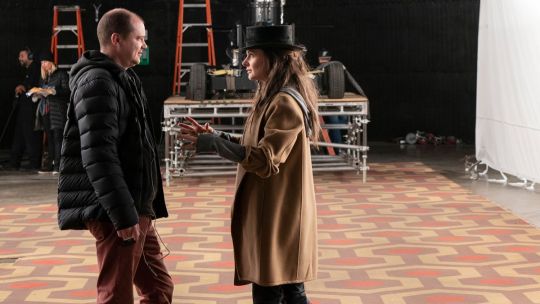
Mike Flanagan’s Description Of Tom Hiddleston’s Big Dance Sequence In The Life Of Chuck Will Make You Want To See The Movie Immediately
Anyone who has read “The Life Of Chuck” has long known that dancing would be a crucial element of Mike Flanagan’s adaptation. After all, the middle section of the three-part story is entirely about an impromptu bit of body moving in public when the titular character gets caught up in the music being played by a busker. That being said, it’s nonetheless fascinating to learn how Flanagan is approaching the sequence in the adaptation – and based on his recent comments, it’s going to put broad smiles on the faces of anyone who watches it.
The most recent episode of the podcast Talking Scared features a number of professional storytellers discussing their favorite Stephen King short stories, and in the 30 minute interview with Mike Flanagan, the filmmaker goes into deep detail about the Life Of Chuck dance sequence. In the movie, Tom Hiddleston is playing the titular Chuck Krantz, and his performance is evidently so delightful that it actually left Flanagan’s face hurting from smiling too much. Said the writer/director,
It's one of those that you read it in a book where dancing is described. And I think King did a really good job with that. You read it in a script where dancing is described. But when you see it and hear it, and we're talking, it's a five-and-a-half minute scene. It's substantial... I've watched people when they watch this, and even people who have seen the movie dozens of times and worked on it... when we were on set filming, it took four days to shoot it, and my face hurt from smiling that long, that sustained, for four straight days. Like, my cheeks hurt by Friday. And, that's the thing I see, is you watch this smile break out over everybody who's, who's watching it.
This description of the sequence in the new film is exactly what one would hope for. The second section of the novella is all about celebrating the random joys of life, with Chuck finding himself caught up in the moment listening to music and finding a wonderful dance partner in a beautiful stranger who also happens to be walking by. It’s a sequence full of effervescence, and it sounds as though Mike Flanagan has worked particularly hard to capture it on screen.
The filmmaker also helped clarify why it is that the movie is earning comparisons to Frank Darabont’s The Shawshank Redemption – which is a film that can be described as an antidote to cynicism. Flanagan explained that his approach for The Life Of Chuck was to make the work sweet but not overbearing:
That joy comes in and it's not saccharine and it's not forced at all. It's kind of undeniably purely joyful. And there are so few opportunities in storytelling to exist in a moment utterly devoid of cynicism and not trying to force an emotional reaction where you're presenting something so purely what it is that the natural human response is to put down the guards and just let yourself be happy to experience it.
If that sounds like it is a very different mode for Mike Flanagan – a filmmaker best known for his work in the horror genre – you’re not wrong, and he said as much in the interview, adding,
I've never worked on anything that had that opportunity. I'm going the other way. I'm way more interested in making people uncomfortable and scared. [Laugh], you know? That's my whole business. And so to exist in a story that was just bringing forth this kind of earnest and bittersweet and realistic and honest joy and introspection. It's my favorite movie I've ever gotten to work on for that reason.
That’s a terrifically exciting sentiment given the extreme quality of Mike Flanagan’s filmography – but that’s not the only cool update that we have from him this week about his new Stephen King adaptation.

Mike Flanagan Reveals One Key Way The Life Of Chuck Will Differ From His Previous Stephen King Adaptations
Mike Flanagan’s love of Stephen King’s work is unquestionable, and it’s obviously reflected in his work. Gerald’s Game and Doctor Sleep feature details that are changed from their respective source material, but they are primarily very faithful adaptations. There is, however, one thing that the upcoming Life Of Chuck has that those two movies don’t, and that’s voice over narration that brings King’s words directly to the screen.
In the Talking Scared interview, Neil McRobert highlights a particularly beautiful passage from “The Life of Chuck” about the character reflecting on his impromptu dance while dying from cancer, and while discussing the material, Mike Flanagan explained how the film adaptation demanded that the prose being directly brought to the screen:
Frequently, when you look at things like that, the concept of narration in a movie, it's wildly improperly used, and it's a crutch in a lot of cases. It's unnecessary or it's distracting. This is one of the only times in my life where I looked at it and said, 'It is essential to this story that King's prose be driving and structuring the movie.' And I'm so glad that, that we did it that way. I don't want to spoil who narrates the film, but that's a big part of it. And having the right voice to these words is critical.
Continuing, he added that there is plenty in the story that is visually captivating in The Life Of Chuck, but that voice over narration was a necessary component in bringing it together. Said Flanagan,
It's a literary experience that has some incredible cinematic weight to it. It's visually incredible to watch the stars burn out or to watch a wonderfully classically choreographed dance number or two. All that is there. But then more than any other thing I've ever worked on, the prose was essential. And not just as a King fanatic, not just as a Constant Reader, but just for this particular story, it had to be there.
The Life Of Chuck is set to make its world premiere this fall at the Toronto International Film Festival, and being a completely independent production, it does not yet have theatrical distribution. Fingers are crossed that will change following its Canadian debut and that the movie will find its way to theaters before the end of the year.
68 notes
·
View notes
Note
Can you explain to me what are the differences between Bungo Stray Dogs, Bungo Alchemist and Beast? Like are they written by Asagiri Kafka, or are they written by different people?
I’ll try
Bungou stray dogs and Beast (Bungou Stray Dogs Beast) are both created by Kafka Asagiri.
Bungou Stray Dogs is a series about characters named after real life authors.
But are based on a character from that authors most notable work. And have abilities that tie into that book as well.
For example Dazai is named after the real author Osamu Dazai and is based off the main character in his book No Longer Human.
Bungou Stray Dogs Beast is 4 volume manga series about an alternate universe from the main Bsd series.
It’s a world where Akutagawa joins the Agency and Atsushi joined the Port Mafia. With other differences here and there.
Bungou to Alchemist is a game that was adapted into a 12 episode anime series.
It’s about famous Japanese authors being reincarnated to protect their books from being corrupted by monsters known as tainted.
The characters are named after famous authors and are based off those authors. So a lot of the dynamics from Bsd are different here as their more aligned to real life.
For example real life Dazai greatly admired Akutagawa so that’s the relationship they have here. In Bsd Asagiri flipped that dynamic around
I hope that makes some sense 😅
35 notes
·
View notes
Text
Is Bill Skarsgård only in remakes ?
This will be long. Really long.
After the relase of The crow 2024 , a lot of comments have surfaced saying that Bill only do remakes and nothing else. That he is where he is because of nepotism and that he only plays dark characters.
How about we review his trayectory according to his imdb page ? Lets see his eldest credit, how long it took him to position himself in america ( his big break) how many remakes has he done and what genres he explored.
If we go all the way down we will see that his career started in Sweden. His first credit come from the 2000's movie Järngänget where he worked with his brother Alex. Bill was 9 years old aprox. Since then he worked ocationally until his teenage years ,when he took the job more seriously , in consecuense he started to gain fame for himself in scandinavia, even nominations for some roles. Like with simple simon (I rymden finns inga känslor)
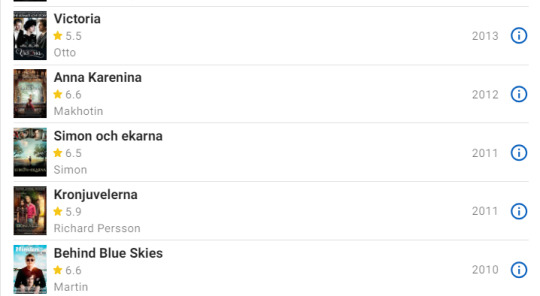
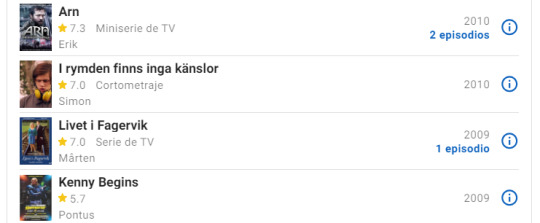
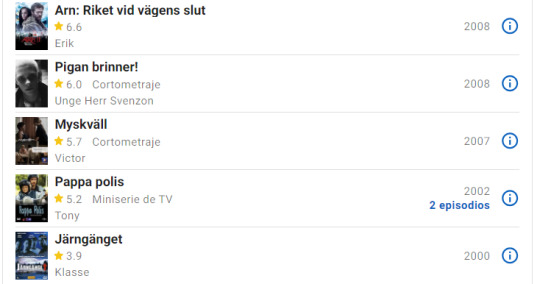
In The crown jewels ( Kronjuvelna) we have Alicia Vikander and Bill skarsgard sharing the screen, both are swedish, and later both participated in the 2012 american adaptation of Anna Karenina (Leon tolstoi novel) sadly for Bill ,being Stellan Skarsgård son did not help his small role from being cut out of the movie. Alicia is the one who gets her big break from this by playing Kitty.
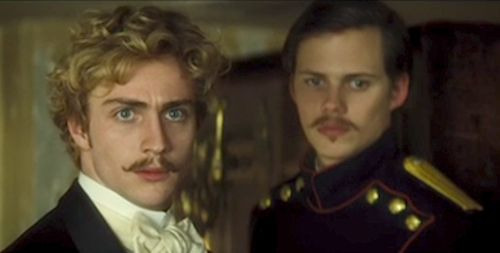
Role: Captain Makhotin
But things don't end there, he may have not done it in american movies yet but he did land the role of the vampire / upir Roman Godfrey in Hemlock Grove (series), another adaptation from a book with the same name, on netflix ( small streaming plataform in the early 2010's) he did a total of 3 seasons.
In 2016 he gets another small role but in the Divergent series , in 2017 Atomic blond ( as Merkel). Now it's in 2017 at 27 years old when his first remake and big break comes: IT (pennywise) . But first lest define briefly what is a remake?
wikipedia says: A remake is a film, television series, video game, song or similar form of entertainment that is based upon and retells the story of an earlier production in the same medium—e.g., a "new version of an existing film".A remake tells the same story as the original but uses a different set of casts, and may use actors from the original, alter the theme, or change the flow and setting of the story. A similar but not synonymous term is reimagining, which indicates a greater discrepancy between, for example, a movie and the movie it is based on
It is a novel by stephen king ,the first adaptation was for tv miniseries of 2 episodes in 1990 with Tim curry as Pennywise. In 2017 another adaptation is released and here is where we open the main debate: The 2017 movie was a remake or another adaptation? I guess is matter of perspective, while is true that the first popular reference we have about the subject is the 90'series , the new production based his storyline and character design in the book... So if you are more familiar with the book you'll call it an adaptation but if you have never read it then it'll be a remake "with differences".
The contrast beetween both vertions of IT is too big to consider the latter ( 2017) a re-do/ remake of the miniseries. You can notice that just by the approach Bill and Tim took on Pennywise. Tim's version was more human, a psycopath like in John Wayne Gacy-esque type. Bill's was a monster, not one trace of humanity in his character, it was out of this world and enjoyed playin/ torturing its meals cause it tasted better basically.
My own take is that IT CHAPTER 1 AND 2 are not remakes of It (1990). But due to pop culture they are considered as such.
Between the IT- MANIA he was in the following productions: Battlecreek , deadpool 2 ( short role), Villians, Assasination nation and Castle rock ( series). He also participated in shortfilms like: A stone Appears, Alteration and Do you like the taste of beer?
Is in castle rock where he plays another creepy role as the kid .For battle creek he is an artistic vulnerable depressed dude. In assassination he plays a misogynistic teen asshole. And with Villains we see him explore his comic side.
This is what I would like to call the transition period, besides Deadpool and castle rock, all the projects previously mentioned are in some way small projects , that he for some reason decided to take on ,maybe for scheduling reasons cause by the end of 2019 IT CHAPTER 2 was premiering.
2020- 2022
The pandemic hit and changed things, he losses momentum. The whole industry was shaken actually. Movies that were supposed to be released in cinemas went to streaming, projects were cancelled and others got delayed.
For example Bill was set to work in The northman with his brother Alex again , he was already in Eggers radar, but due covid he had to drop out: Here
He left that project because something else was scheduled: Clark. (netflix nordic) a series he helped to produce too.
From this time we got Nine Days, The devil all the time (one of his best works and one of his most underrated film. He plays Willard a traumatized ww2 veteran), Soulmates (a series - one ep. He plays a uptight gay man who finds love while vacationing in Mexico), Naked Singularity ( he's an lawyer with adhd and a weird obsesion with ears) , Eternals ( KRO) ,Barbarian (horror movie where he is just a good guy who's in the wrong place at the wrong time )
By this time he was still under the shadow of " pennywise" but he had built a reputation for himself, he was a good actor before the critic and public that followed his work. Not as popular as Alex ,for example , but he was known by now.
2023 -24
After the pandemic we enter the period I woud like to call : COMEBACK.
The projects we find here are more "commercial" because these are action films, which is not bad , it was about time, most of his films usually dont get too much of exposure or are small projects. If someone said Bill Skarsgård automatically people thought in the clown 🤡 and not in Kro, mickey, willard or Clark for example. So we see here some sort of rebrandig he's now a killing machine, a cartoonish villain and anti hero.
John wick 4.
This offer came to him thanks to a previous work he did in Atomic blonde. Chad stahlesky let him choose what character play ( here) , and he went for the bad guy. A cartonish kinda old school villain , with funny accent and great suits: The marquis de Gramont.
Now, a very common observation people do is that roles are offered to him and his just takes them. That he is like a passive actor who only plays what he's tell to play, but since Pennywise he has always talked about how much he gets involved in the making of a character. The marquis was not the exception. That annoying accent was , for example, his idea. here more about it
This participation was a breath of fresh air, and brought new eyes to him. New fans arrived, people saw more of his work and he stepped a bit away from the IT shadow. Later was confirmmed that his next project would be BOY KILLS WORLD a pure gory action film with some comedic touch for which Bill prepared hard.
Moritz Mohr: Bill is a terrific actor. The only thing we weren't sure at that point was, "Can he deliver on the action?" He basically just promised, "No, I'm gonna put in the work, I'm gonna get ripped, I'm gonna train, and I'm going to learn the choreography." Which is a huge commitment, because it's just months and months of training and rehearsing, and I'm so glad that he did it. He overdelivered sometimes, he was really committed to it, and I'm very lucky that he was, because I think the results are just phenomenal.
In BKW we see Bill has good comedic timing, as if that wasn't clear with previous projects like Villains , but here he delivers comedy without talking. Conclusion : he can also be funny.
So far we are very into 2024 and NO MORE REMAKES in sight for him besides IT and we have talked about how many movies- series ? Almost 20 since his first big job in America (Hemlock G.)
The recent fame of " remake actor " comes from the next two jobs he landed. The crow 🐦⬛ and Nosferatu. 🦇
The crow 🐦⬛: How Bill got the script on his hands? it was given to him because he is known for remakes, because of his lastname , because no one else wanted to do it ? Luckily for us , Empire magazine tell us the following:
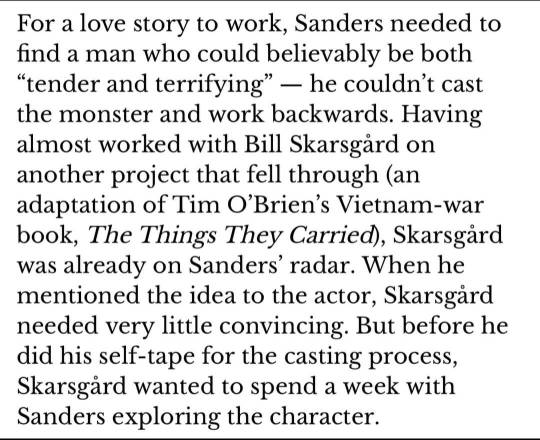
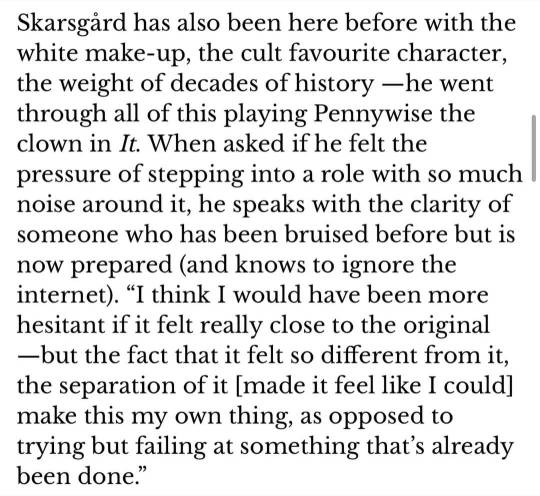
The project was conceived to be a separate work from the 1994 movie the crow, the source of inspiration was THE CROW graphic novel of J.O Barr. Again, by this and more interviews around we see Bill as an actor who played and active part in bringing a unique version of eric. From the physique ( something he kept from filming BKW) to the aura he's nothing like Brandon lee's Eric Draven.
The big differences between the 2024 and 1994 version, are confirmmed now after its release with heavy critics of people claiming it to be a "bad remake cause it looks nothing like the original " Here I ask rethorically , so is Bill a remakes actor or not?
Remakes are in full force lately, examples are whatever Disney has been doing lately, the ghostbusters, robocop , etc. Movies that go frame by frame , super close to their media source.
The same way Dune 2022 is not considered a remake of the 80's movie , The crow 2024 shouldn't be considered one either. Not even IT. Because, primarily, the source material is not the previous movie or series, but a book or a novel. So the best term to use is , I believe, adaptation or reimagining.
But what about Nosferatu?
I'm glad you asked random tumblr reader. I'm almost finishing and this is where I want to suggest that this upcoming film is actually the first remake Bill Skarsgård has done.
Robert Eggers ( director of this new remake ) shares with anOther magazine, that he planned to film Nosferatu after The witch , that's how he met Bill , who was 25 by then ( at 25-26 he was also auditioning for IT) . Eggers recalls Bill's audition being excellent for Hutter . Unfortunatelly the project fell but they stayed in contact and planned to one day work together , Bill was later set to work in the northman , we already know how that played out.

As we see here Bill was the one trying to get the opportunity to work with the director, having another role in mind ,until Eggers proposses to him the opportunity to be Count Orlok thanks to the work he did as Bob Gray in IT chapter 2.


Eggers knew about his capacities as an actor to embody darkness while having a youthful and pretty exterior that's why he tought of him as the right choice for the project.
Once again we read an interview that highlights the joint work of the director and Bill on the character, from the psyque to the make up. He was very proactive, long conversations, audio tapes, isolation, voice coach , etc. All of which finally paid off

Bill Skarsgård has proven his desire to become a versatile actor, just by reading his imdb page we see a variety of works forming his resumee , but he has a particular preference for dark, scary , creepy roles. In this review since the Hemlock grove days he has played a total of 7 obscure characters ( from antagonist to conflicted ones). This alone is not bad, and they aren't that many either. Every actor have a genre they prefer , characters they feell more pulled to work with. Bill is a goth king and I respect that.
His career itself also proves to be the result of organic growth, although he was lucky to be part of one of the most successful and respected acting families in sweden , that alone couldn't have granted him is current success. He started in America with a small show that most people haven't heard of till this day, and was in his late 20's when he got his first big opportunity. He sent emails, he sent tapes, he auditioned, he gave his word promising to deliver a good job. He works his ass off for what he wants. He doesn't seem to be the classic textbook nepobaby.
That's why I think that considering him just a remake actor is unfair and narrow minded. Said statement reduces a still growing career full of exploration to just opportunistics cashagrab roles ... and this guy is far from being that. Also because not everything that shares a tittle or character's names is a remake. It dependes on what the creators are having in mind for the new work.
That's so , after reading the most recent AnOther magazine interview , that I came to the conclusionI expressed before: Nosferatu is his first remake . Both Bill and Robert Eggers have always in mind the 1922 movie as source of reference and they worked Count Orlok and the story around that.
He's still a rising star, and has a lot more ahead, im confident the general public will see what directors and fans have seen in him: A good mfucking actor who wants to leave a mark but in his own terms. Taking risks , exploring, chosing roles that may not look right for him but always improving himself to expand his potential and keep taking on new and more promising challenges.
Its intersting how everything connects , IT oppened the door of Nosferatu. After all the issues that came to him at the right time , and I can bet my left arm he will deliver !
*Im sorry if this was too long it took me 2 days finishing it ,i'll go to sleep now .
#bill skarsgård#bill skarsgard#billskarsgard#the crow 2024#boy kills world#nosferatu#hemlock grove#IT#pennywise#marquis de gramont
36 notes
·
View notes
Text
Lisa Miller vs. The Screen

Scott Pilgrim vs. the World is a six-volume graphic novel series that was published in 2004 by Canadian cartoonist Bryan Lee O’Malley. Through the growing fan base surrounding the novels, its story was adapted into four types of media, the most notable being the movie. The franchise boomed in popularity since its 2010 motion-picture adaptation, proving that as the years go by, most of the series' fans come from the hour-and-fifty-two-minute-long self-described epic. Gradually becoming a staple in pop culture, it was difficult to miss in online spaces, but one component of the story slipped through the cracks: a character named Lisa Miller. Completely scrapped from the movie script, fans of the Scott Pilgrim universe who are unfamiliar with the original graphic novel series will be pleasantly surprised if they look back on the source material; Lisa is a far richer character than the other adaptations fail to depict. She is more than a mislabeled "manic pixie dream girl" and contributes to the plot's progression in a major way.

Zeroing in on the well-known film adaptation, entire storylines were scrapped from the script, one of which follows Lisa closely. Introduced in Volume 2 and then properly utilized in Volume 4, she is established as an old friend of our protagonist, Scott Pilgrim. Meeting in high school, Lisa and Scott became fast friends then created a band together with drummer Kim Pine called “Sonic & Knuckles.” This flashback that lasts about 34 pages gives the audience a peek into how these characters came to know each other while Volume 4 builds on Lisa’s motives and feelings towards Scott.

Lisa, abruptly entering Scott’s life after around a decade, strains his relationship with his current girlfriend, Ramona Flowers, leading her to believe he is cheating. The couple quarrels on and off throughout the book as Lisa looms on the sidelines. The two have a big fight, leading to Scott getting kicked out of the apartment for the night. Stuck with nowhere else to turn, he calls Lisa, and she lets him crash at her place. There seems like she has an ulterior motive; she dressed suggestively, subtly moving closer to our unassuming protagonist within each panel, causing an alarming amount of tension. Scott comes to his senses and proclaims his love for Ramona to Lisa, rejecting any and all advances and closing the door on her one-sided infatuation. The three of them move on from this, Scott and Ramona remaining a couple and Lisa leaving for California to pursue an acting career.

This (very) brief summary of her arc fails to capture the depth of Lisa’s character. Discussing her Volume 4 actions further shows that this character propels our two protagonists, Scott and Ramona, through their own respective character arcs. Giving our main characters more than their regular relationship—as regular as “defeating seven evil exes” can be—creates a refreshing plotline within an episodic graphic novel series while simultaneously developing the audience’s understanding of the two. Illustrating a clearer image of Scott and Ramona’s relationship beyond the rose-colored glasses applied to the audience in the first couple of volumes is beneficial for the development needed to maintain undivided attention throughout the story.


Let’s discuss how Lisa's presence affects Scott Pilgrim’s character arc. Her short-lived appearance in Volume 2 set the stage for Volume 4, with most of the reason Scott decides to reconnect coming from nostalgia. Bringing Lisa around the group shortly after their reunion, this nostalgia-driven get-together expanded their individual connection, branching out into her connecting with everyone else; the only person Scott worries about is Ramona, his girlfriend. The undeniable discomfort present on his face as the two women interact feels uncalled for—considering Scott has not done anything inherently wrong—as he remains on edge the entire time they interact.

The coup de grâce of it all is when Scott stays at Lisa’s place the night after his big fight with Ramona. She finally comes clean about how she has been acting since they have reconnected; her dressing “all tarted up” specifically for Scott because he “couldn’t take [his] eyes off [her].” She felt awful about her actions, but she kept going anyway. When Scott tells her why he is there, he is greeted with a romantic advance. The panels fade to black and open back up to the next morning. Lisa filled Scott in on what happened: he chose Ramona over her—the panel explains it far better than I could summarize. Lisa plays a significant role in Scott's character arc, demonstrating how much he has matured and improved his relationship skills, realizing he feels genuine love for Ramona and should confess through Lisa’s actions.

Ramona’s growth is not as extreme as Scott’s but still offers further characterization absent in the film adaptation. Like Lisa, the two women have little to no character development; Ramona at least stars in the movie while Lisa lands a namedrop. The blonde’s introduction back into Scott’s life damages Ramona’s trust in their relationship, partly due to the fact she had not once heard of her before this, that the two have been spending an awful lot of time together, and that he is too dense to realize the subtle advances Lisa had been making the entire time. Creating friction and hostility between the couple generates a peek into Ramona’s mind, an infrequent occurrence throughout the six volumes. The two women share multiple “manic pixie dream girl” attributes—this is a complicated movie trope to dissect here, but a simplified definition can suffice. The MPDG is a female character portrayed as eccentric and desirable used only to push the plot in a film forward. They have no other character traits besides that, they are sort of like props. Lisa falls into this category and Ramona falls here only in the context of the film; Lisa’s existence prevents Ramona’s mischaracterization in the movie from happening within the books, acting as a character foil or “Evil Ex” for her in a way.

Winding down from intense character descriptions, Lisa Miller plays a pivotal role in the Scott Pilgrim vs. the World adaptations. While she may not be involved in the most popular portions of the franchise, she still holds up as an important part of the original story. With occasional references here and there, Lisa remains a piece of the oversized puzzle of Scott Pilgrim. Fans of the film unfamiliar with the graphic novel series’ story are highly encouraged to read back on what they are missing: the character of Lisa Miller is far more nuanced than she is usually portrayed as online. She serves as more than just a “manic pixie dream girl” and has an enormous impact on the plot's progression.
#lisa miller#scott pilgrim#ramona flowers#i cant stand her#im going insane#i need a lobotomy#scott pilgrim vs the world
30 notes
·
View notes
Note
pls can we get your most niche tlt headcanons/ canon points you think are too overlooked or unappreciated/ fanon you see too often mistaken for canon/ juicy background bits on the babytrap or skater AU or otherwise.. the ppl are starving
omg this is exactly the treat i deserve after doing so many chores today, im gonna hit all these categories just for funsies
niche tlt headcanon: this is maybe more a theory than a pure headcanon but i think someone in Camilla's direct family line, either a parent or a grandparent, was from outside the Houses. Hect is an arithmonym, but it's not Sixth, it's a prefix meaning 100. as there's no 10th (or 100th) House, i like to think this is meant to indicate that someone in her recent family tree was an outsider! also she's hot enough for the Alexandrites, which suggests at least one of her bio parents or grandparents was hot enough for the Nireids and perhaps scored some out-of-House genetic material to spice up the Sixth's diversity. also Silas questions her eligibility to be cav primary, and since she's brilliant and badass and the Sixth don't base these things on bloodline/inheritance, there's no reason for even a prig like Silas to disqualify her other than some kind of citizenship issue. anybody with at least one Sixth parent is considered Sixth, that's their whole deal, but maybe the Eighth take a dimmer view?
smaller but purer headcanon that has no basis in anything except my gut: i think the "very silly" description of herself that Dulcie sent to Pal and Cam, and the drawing Cam sent back (mentioned in TUG), is a reference to this classic of ancient tumblr
overlooked/underappreciated canon moment: at this point i dont think there's anything i have noticed that i haven't seen at least one person blog about, but one of the tiny little things that gives me shrimp emotions is Gideon in the pool scene, after she's had this intense thing with Harrow, and then Harrow starts waxing about her beloved in the Tomb: "[Harrow's] voice had the quality of someone in a long dream. She stared through Gideon without looking at her, and Gideon gently took her hands away from Harrow's jaw. Instead she sat back in the water, buoyed by the salt, her eyes starting to sting from it." she's suddenly being told that Harrow is into someone else, she assumes these feelings she's been slowly catching are doomed before she can even really examine them, she pulls back from the very intimate position they've just been in, and she has a quiet lil cry about it that she won't even acknowledge in the narration. BUT I KNOW WHAT THAT SALT STINGING YOUR EYES IS GIDEON NAV
fanon you see too often mistaken for canon: GIDEON ISN'T STUPID T^T she's not a himbo jock, she's just a jock who doesn't care about necromancy! she also can't sense it, so she naturally has less information than Harrow about what's going on in GtN. she has a baller vocabulary, she's strategic, she's observant, she's super good at what she does, and she adapts to a completely novel situation VERY quickly.
also? i understand why it's visually more appealing to draw Kiriona with her chussy out, or modern au Gideon showing a lot of skin, i dig it, im hot for her too. but Gideon is canonically shy. she doesn't even take off her robes to duel in GtN, and is so constantly hooded that nobody even knows she's a redhead until halfway through the book. Kiriona is buttoned up to the point of wearing a goddamn ascot to cover her neck hole. i definitely understand au situations where her upbringing was different and so she's a little different, that's part of a good au for me, but it still always crosses my mind when i see her with her shirt wide open or her tummy out or in booty shorts or something. she's hot and she wants everyone to think she knows it, but deep down she does not know it and doesn't really flaunt it, except those guns
juicy background bits on babytrap or skater au: hmmmmm. Kiriona would deny it's the reason she hasn't named the baby, but she IS waiting for Harrow. she doesn't feel like she has the right, and she has complex feelings about both the names her own parents gave her. she has a deep-seated sense that Harrow, who is smart and cares a lot about doing things the right way, will be better suited to this responsibility.
in the figure skating au...a minor character from early in the story is going to be very important in the sequel fic, i think.
32 notes
·
View notes
Text
TW discussion about SA
Let me start this off by saying that I love amc iwtv. I think its a great example of an adaptation where the people involved have a lot of respect and love for the source material. However i have a huge issue with the Bruce storyline. Im so fucking sick and tired of SA being used as a way too make female character evolve/grow. Its cheap and incredibly lazy. And in Claudias case it was completely unessecary. She is such a great and complex character on her own and it would have made more sense to let her grow without adding the rape. I think its weird, gross and honestly quite sexist to make these kinds of stories. A woman is perfectly capable of evolving without sexual trauma. And also Claudia is 14. And in the book she is 5, shes even based off Anne Rice real daughter who died shortly before her 6th birthday. Claudia is such a strong and complex character in the book. So I cant for the life of me grasp why the fuck the writer of the show decided that it was a good idea to inklude the SA. Ive seen it way too many times in media. Unessecary sexual violence towards women under some misguided idea that its empowering for women too see it on screen and how the character learns from the experience (you know cause women can only be strong and self aware if they get raped) SA is one of the most vile things a person can go through, its not something that should be used as a plot device to make female characters strong. Also the fact that she "calmed down" after. Like when she comes back and says "i wasnt right in my head, I am now" that really pissed me off. And yes I know there are other things that play a part in that. But it seemed to me that the thing that made Claudia mature was the rape. Anyways fuck the film industries obsession with sexual violence towards women in the name of female empowerment, its disgusting. Rant over.
26 notes
·
View notes
Text
nepenthe: (n) "that which chases away sorrow".

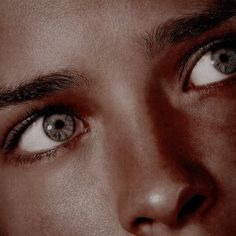



pre tlt-tlo. luke castellan x child of a minor god!reader. 700 words, prologue.
synopsis: time keeps slipping away. luke slips along with it. you were never important enough to care, anyway.
warnings: godly parent of the reader isn't mentioned but is specified to be a minor god. mentions of luke and reader making out, reader is said to be the eldest out of their siblings, kind of toxic situationship between luke and reader. minor book spoilers? (I haven't watched the show yet)
note: i'm writing on tumblr after almost a year and a half, this isn't that gooduprwefjod. this is just a brief intro to the possibility of a bigger series under the same reader, kinda? if it does go ahead, it will be based on the books! idk how i feel about it so far, but I'm always open to listening to feedback!

At Camp Half Blood, there remain a few things you cannot learn, no matter the amount of harsh, gruesome training you’ve gone through.
For those who look for it, every day is a new lesson. For example, capture the flag: every game tells you more about your opponents and allies when you know how to look for it. With every game you start to notice how the Area kids undermine the minor gods in cabin eleven, almost forgetting their existence. You notice yourself clubbed with children of another minor god, despite sharing nothing with them, you notice the way Luke’s expression goes blank and tenses up when he notices that.
So you ask him about it late at night, away from the campfire and chaos, bodies pressed together and hips pressed against each other. He replies by biting on your bottom lip, you retaliate by pulling his hair. The next thing you know, you’re pushed up against the wall and a little over half an hour later you walk into an empty cabin eleven with a purple bruise blossoming on your neck and lips swollen red.
A corner on the room’s floor is dedicated to your siblings and yourself. and you wonder how long Luke will keep it reserved for them—for you. You wonder, will the treatment end the moment this . . . affair between you two ends? How will you explain this to your siblings then? When you finally need to deal with the jealousy that comes with being somewhat special to a counsellor.
So you learn to adapt, to take advantage of those who undermine you, and to make allies with those who understand your strength. It’s not hard getting your siblings to listen to you, after all, you are the eldest with two quests weighing down on your conscious daily, but having that achievement means little to nothing when your godly parent isn’t an Olympian.
You sit down in the corner of the room, knees tucked in your chest and you look around. You have three siblings on your godly side, a diary hidden under Luke’s (because no one would respect your privacy, yet they wouldn’t dare breathe in Luke’s way like that) pillow containing their names, mortal addresses, mortal family’s numbers and blood types noted down. You wonder if Camp Half Blood would have a proper funeral if any of you—not just your siblings, any of the children of the minor gods—died. Would there be a grieving period? Would someone look for you? Would they even call the families you’ve left in the mortal world or would those who care wonder what happened to you all?
No minor god is as important as Olympians and as much as no one says it, you can feel it—you all can feel it.
A child of Nike can win better than a child of Ares, no one gives them the credit of winning, though, it’s always beginner's luck. Camp survives on the magic and mist of Hecate and yet no one, *not one person* appreciates any of her children. Iris is responsible for most, if not all, of the communication at camp and yet no one includes her children in any conversation. Tyche and Hebe’s children are almost as joyful as the Apollo and Aphrodite campers, yet no one smiles or dances with them. The goddess of luck’s children have none here. Nemesis cradles her children, promising justice and vengeance, and Hypnos lulls his kids to sleep, ensuring no nightmares whilst they sleep, unable to do anything to the bullying when they’re up.
Your parent is amongst these minor gods, and whilst they do care slightly more than Olympians do for their kids, you cannot help but be angry. Anger that you know will be spent on the Hermes counsellor, pushing him till he pushes you back, till you’re both breathing heavily into each other’s mouths and till your nails scratch red lines down his back, after all, it’s what you two do to each other.
No conversation, no understanding, no labels. You two are just two teenagers angry at the world for taking their parents away. Nothing else to each other, right?
#( ✸ ) half divinity#( ✸ ) pari's works#( ✸ ) not a request#luke castellan x reader#luke castellan#percy jackon and the olympians#percy jackson and the olympians x reader#pjo x reader
91 notes
·
View notes